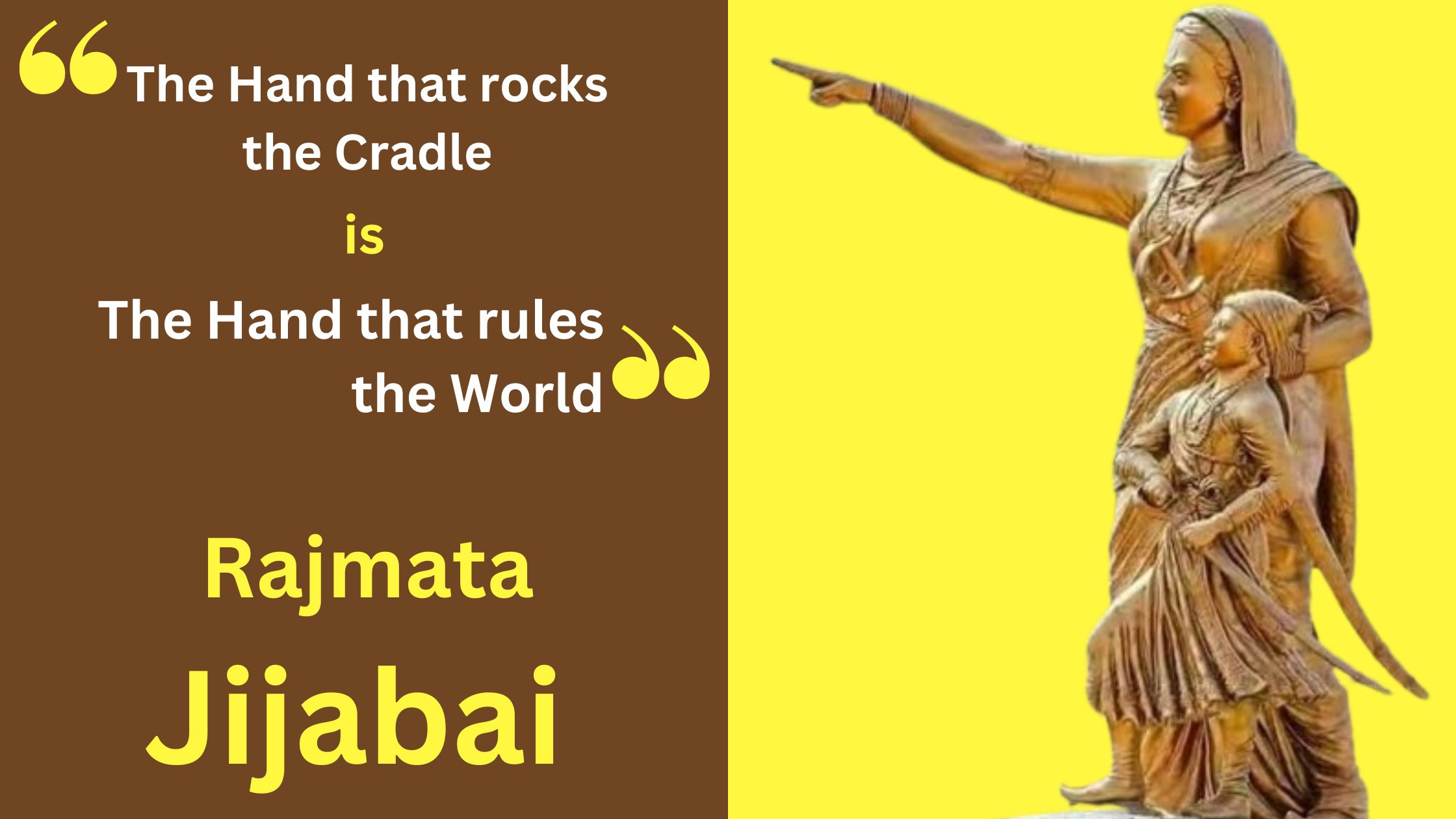

Jijabai – The Guiding Light Behind Shivaji Maharaj’s Triumph
Discover the extraordinary life of Jijabai, the princess of Devgiri, who defied tradition and instilled values in the heart of Maharashtra. Uncover her journey from conflicted origins to guiding her son, Shivaji Maharaj, to his coronation. Immerse yourself in a tale of heritage, courage, and steadfast determination.
Introduction
In the annals of Maratha history, one name stands out as a beacon of guidance and strength – Jijabai. A pivotal figure in the rise of the Maratha Empire, Jijabai’s life and legacy have left an indelible mark on the course of history. From nurturing a young Shivaji to his ascension as Chhatrapati, Jijabai’s contributions were profound and far-reaching. In this article, we delve into the life and influence of Jijabai, tracing her journey from her early days to the crowning glory of Shivaji Maharaj’s coronation.
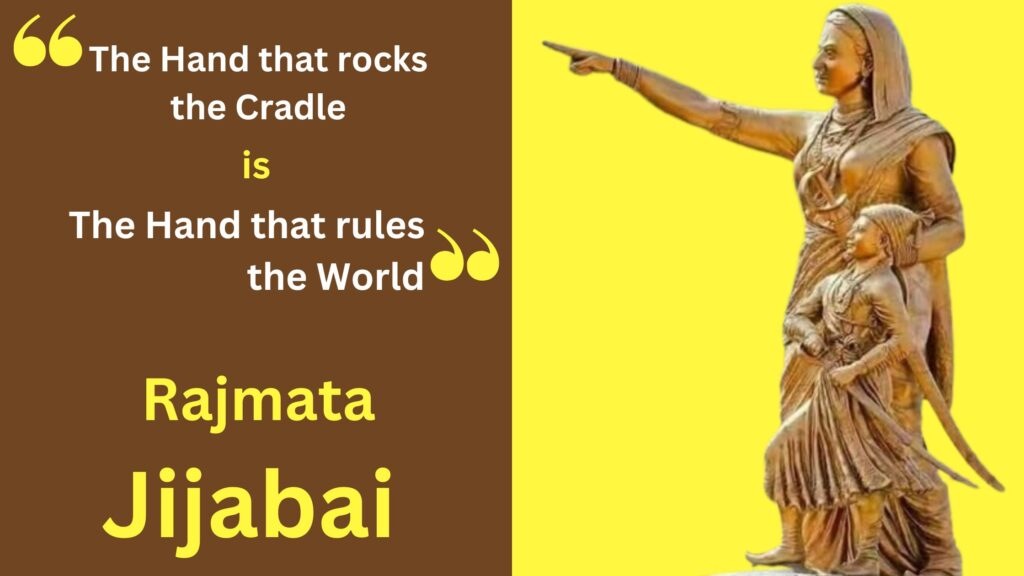
Early Life: Nurturing Values and Aspirations
Jijabai, affectionately known as ‘jiu,’ was born in 1598 A.D. to Lakhojiraje Jadhav in the revered territory of Sindkhed in Vidarbha, Maharashtra . This land was not just a geographical location; it was an emblem of heritage and pride. Jijabai lineage traced back to the Yadavas, the traditional rulers of Devgiri. In essence, she was the very princess of Devgiri, carrying within her the legacy of regal blood.
Lakhojiraje Yadav, Jijabai’s father, hailed from a lineage steeped in valor and tradition. He belonged to the lineage of the Yadava rulers of Devgiri, which added a touch of royalty to Jijabai’s origins. However, along with his three sons, he was working as a chieftains in the Sultan’s military. This decision was a point of contention and inner turmoil for Jijabai.
Amidst the grandeur of her lineage and the shadows cast by her family’s role of serving the invaders, Jijabai’s early years were shaped by a profound connection to her cultural roots. She grew up amidst the echoes of ancestral tales and the melodies of traditions. However, the seeds of conflict were sown, as she would sputter with rage at the way the invaders were treating the Hindus. She grew up with a fierce loathing for everyone who degraded Hindus by any means necessary.
Jijabai Marriage
Conforming to the conventions prevalent during that era, Jijabai’s matrimonial bond was established during her tender years, at the age of merely 8, to Shahaji Bhosle. The groom, Shahaji Bhosle, was the offspring of Maloji Bhosle, belonging to Verul village. The nuptial ceremony unfolded on the 5th of November, 1605, within the premises of Sindkhed.
Remarkably young, Jijabai, at a tender age of eight, was united with her husband, who himself was scarcely twelve years old. Reflecting the norms and practices of the times, Jijabai continued to reside with her parents for a number of years prior to formally joining her husband’s household.
Jijabai was from the Jadhav Family and Shahaji was from the Bhosle family. Although they were married, the Jadhav’s and Bhosle’s were not at good terms. They had their internal conflicts. So, Jijabai had her relations strained with her Father and Family. To add this, the Nizam’s orders compelled Lakhoji Raje to march with his army to Junnar, tasked with capturing Shahaji Raje.
However, this decree bore a heavy burden on Jijabai, who was carrying a life within her womb. The arduous journey to Pune on horseback was an impossibility for her in such a delicate state. In this poignant moment, Shahajiraje, her husband, displayed his care and consideration. Understanding the challenges that pregnancy posed for Jijabai, he took decisive action.
Shahaji Raje entrusted the guardianship of Jijabai to two pillars of support – Vishwa Rao and Vaidhyaraj Nirgudkar, a respected doctor. The confines of Shivneri Fort became her sanctuary, a place of refuge as Shahaji Raje embarked on his journey to Pune.
Meanwhile, as destiny would have it, Lakhoji Raje’s path intersected with his daughter’s once again. After years of separation, he reached Junnar and found himself at the gates of Shivneri Fort, a poignant reunion in the midst of the prevailing chaos. He blessed her for a healthy child and left the Fort.
Jijabai’s Suffering and Determined Certitude
In a heart-wrenching turn of events, the Nizam’s insidious plot unfolded. Jijabai’s father, Lakhojiraje, along with her three brothers, were summoned to the royal court by the Nizam, ostensibly unarmed. However, deceit lurked within this apparent gesture of diplomacy. Tragically, their lives were mercilessly extinguished in a treacherous act that shattered the very foundation of trust.
The aftermath of this callous betrayal left an indelible mark on Jijabai’s heart. Her maternal family, once proud and thriving, lay in ruins, victims of a ruthless act of violence. However, amid the devastation, Jijabai’s spirit remained unbroken. yearning for ‘Swaraj,’ the vision of self-governance and independence that continued to burn brightly within her.
Swarajya – Dream of Jijabai
Jijabai would have easily be leading a Queens life as she had all the material things but her heart beat for a different purpose. She saw herself as part of the original Marathas, the Kshatriyas whose very existence was meant to safeguard their subjects, lands, saints, and righteousness.
Jijabai’s spirit could not fathom the concept of subjugation. She envisioned a realm where their destiny rested in their hands, a land where freedom, sovereignty, and righteousness prevailed. Jijabai’s dream surpassed the mundane; it was a vision of a sovereign throne, an independent realm guided by their own ideals and principles
Inspiration from Epic Narratives:
Jijabai inhabited a league of her own. When she was pregnant, she inspired herself from our Epics. A fervent devotee of Tulajabhavani, her spirit resonated with that of the Mother Goddess Jagadamba, who valiantly battled demons for nine days and nights, purging the land. Jijabai saw herself in a similar light, envisioning a crusade against the Sultanates that held their sacred land captive. Her resolve was steadfast, ignited by the suffering inflicted upon Maratha homes, the region, Hindu deities, and the very fabric of their faith.
Jijabai’s heart resonated with the timeless tales of Ramayana and Mahabharata. As she immersed herself in the narratives of Ram, Hanuman, Sita, Krishna, Draupadi, Kunti, and others, her mind underwent a profound transformation. The echoes of these stories etched their mark on her consciousness, leaving an indelible influence.
Jijabai found herself drawn to the grandeur of these epics, where valor and righteousness prevailed. The tales of Ram’s devotion, Hanuman’s boundless strength, Krishna’s wisdom, and the indomitable spirits of Sita, Draupadi, and Kunti stirred her soul. Their deeds showcased the triumph of good over evil, the establishment of just kingdoms, and the embodiment of powerful ideals.
In the tapestry of these narratives, Jijabai saw a reflection of her own aspirations. She pondered whether her name could one day be spoken alongside the revered Kunti’s. Kunti, the mother of Bheem and Arjun, stood as the epitome of strength and guidance. Her sons had vanquished demons and Kauravas, sculpting a realm of happiness and righteousness. Kunti’s legacy was one of courage and regality; she was hailed as the mother of valiant hearts, the mother of kings.
Jijabai’s heart echoed with the desire to emulate Kunti’s legacy. She yearned to stand alongside her as a beacon of strength and leadership. Jijabai’s dreams weren’t limited to her own family’s fortunes; they extended to the very land she held dear. She longed to carve a realm where bravery reigned, where justice and prosperity flourished, echoing the heroic tales that had shaped her worldview.
Mission Swarajya
When Shivaji was just 6 years old, Jijabai Shifted to Pune with him. The decision to stay at Pune was very bold because It was completely destroyed. But then Jijabai had some other plans. Jijausaheb’s persistent dreams, behavior, and words were all centered around one goal – establishing an independent Maratha Swarajya.
Her courageous step, immediately upon reaching Pune, to erase the symbols of subjugation, marked the beginning of her brave endeavor. She aimed to mend the wounds inflicted by the Adilshahi forces, restoring temples, homes, and hope to the city. Pune, once in darkness, began to witness the glow of small lamps. The signs were evident; a new kind of progress was replacing the old, a plough of sovereignty replacing the yoke of subjugation.
Shivaji Raje’s own independent seal was being actively utilized, with twelve village artisans and local laborers working alongside him, fostering optimism. These signs heralded the arrival of a promising era for the entire region. Slowly but steadily, Jijausaheb was awakening the Pune region, particularly the youth of Maval.
Aaisaheb’s involvement in the court proceedings left a significant impact on Shivba. She often presided over judgments, attentively hearing disputes and delivering impeccable rulings. She even settled the gurav dispute in Jejuri. Her and Pant’s administrative role began shaping Shivba’s perception of justice and injustice. The principle of ‘Justice’ began ingraining itself within him, making him increasingly intolerant of injustice. This awareness culminated in his recognition of the most colossal injustice – the foreign Sultanate’s dominion.
Dadoji Konddeo is attributed to the comprehensive oversight of Shivaji’s later education. When Konddeo assumed this responsibility, Shivaji was eight years old and had already received instruction in Sanskrit and military strategies from his father. Dadoji Konddeo guided Maharaj’s education from 1636 to 1646.
So, on one hand Shivaji was learning the lessons of Justice, on the other hand he was trained in warfare. Gradually, Jijabai could see and feel the sparks in her son to attain Swarajya
Teachings of Jijabai –
To understand the heavenly teachings of Jijabai one has to spare a moment and repeat in your mind that Shivaji was a mere teenager, at the age of 16 when he captured his First fort Torna in the quest of Swarajya. From here, it was a roller coaster journey, there were lots of ups and downs. But Teachings of Jijabai and her support was always there for Shivaji Maharaj right up to his Coronation. Here are some of the key teachings that had the potential to transform lives:
Embrace Fearlessness and Courage
Jijabai believed that true strength lies in confronting fears head-on. She encouraged the cultivation of fearlessness and the courage to stand up against injustice. By facing our fears, we unleash our potential and pave the way for personal growth and success. A teenager embraced this fearlessness and Captured Torna Fort right away to perform such feats more often thereafter
Uphold Moral and Ethical Values
Central to Jijabai’s teachings is the importance of upholding moral and ethical values. She emphasized that success achieved through dishonest means is short-lived and hollow. By staying true to our values, we create a strong foundation for sustainable success. So, very true, because even after years passed by the Dream of Swarajya inspired generations of Freedom fighters and even inspires us today.
Nurture Resilience in Adversity
Life is filled with challenges, but Jijabai’s teachings teach us to embrace adversity with resilience. She believed that setbacks are stepping stones to growth. By learning from failures and persevering, we can emerge stronger and wiser. What great example than the treaty of Purandar? He had to handover 23 Forts to the Mughals. But, he never lost the plot and Shivaji Maharaj came back with a strong vengeance and determination
Foster Empowerment Through Education
Jijabai recognized the transformative power of education. She emphasized the significance of knowledge and believed that it empowers individuals to make informed decisions. Education is a key that unlocks doors to opportunities and self-improvement. So, his education was multidisciplinary. Right from Justice – injustice, to handling administration, to Guerilla warfare tactics, to a great yoddha.
Lead by Example
Leading by example was a fundamental principle of Jijabai’s teachings. She believed that words hold meaning when accompanied by actions. By embodying the values we advocate, we inspire others and create a positive ripple effect. When Shivaji Maharaj was trapped at Agra, Jijabai, even at an advanced age look over the administration and also took the important decisions related to Swarajya. Shivaji Maharaj himself has lead by examples in many of the warfronts. This teaching of Jijabai was not just confined to the King but the Soldiers he produced. Be it Tanaji Malusare , or be it Baji Prabhu Deshpande , all led by examples that are revered as Inspirational stories even today
Practice Compassion and Empathy
Compassion and empathy were integral to Jijabai’s teachings. She believed in extending a helping hand to those in need. By practicing kindness and understanding, we create a harmonious and supportive community. So, in the true spirit , Shivaji never ruled his Kingdom but practiced A course of being a King . He is fondly and rightly called as “Rayatecha Raja” meaning King of the Common People.
Frequently Asked Questions:
Who was jijabai, and what role did she play in maratha history.
Jijabai was the mother of Shivaji Maharaj, the founder of the Maratha Empire. Her role went beyond being a mother; she was a pivotal figure in shaping Shivaji’s character and guiding him toward his remarkable achievements.
What were Jijabai’s origins and early life?
Jijabai was born to Lakhojiraje Jadhav in Sindkhed, Maharashtra, in 1598 A.D. She hailed from the lineage of Yadava rulers of Devgiri, adding a touch of royalty to her heritage.
How did Jijamata view the invaders and the state of the Maratha region?
Jijamata developed an intense hatred for the invaders who humiliated Hindus. She observed the devastation caused by continuous warfare and the plundering of the region by the Sultanate armies.
How did Jijamata’s upbringing influence her actions and decisions?
Jijamata’s early years were steeped in cultural heritage and tales of valor. Her upbringing nurtured a sense of duty, resilience, and a commitment to her people’s welfare.
What was Jijamata’s vision of Swarajya (self-governance) and independence?
Jijamata’s relentless thirst for Swarajya drove her aspirations. She dreamt of establishing an independent Maratha kingdom free from subjugation, drawing inspiration from epic narratives and historical figures.
How did Jijau saheb contribute to the resurgence of Pune and the Maratha spirit?
Upon her arrival in Pune, Jijau saheb initiated efforts to erase signs of subjugation. She worked to mend the wounds inflicted on the city by Adilshahi forces, renovating temples and households and igniting hope in the process.
Did Jijau saheb have a role in Shivaji’s education and values?
Dadoji Konddeo supervised Shivaji’s education, but Jijau saheb influence in shaping Shivaji’s character and values cannot be understated. Her commitment to justice and righteousness deeply impacted Shivaji.
How did Jijau saheb’s actions influence Shivaji’s perspective on justice and injustice?
Jijau Saheb’s active involvement in court proceedings and her commitment to fairness ingrained the principles of justice within Shivaji. He witnessed firsthand the impact of injustice, further fueling his determination.
How did Jijau saheb’s vision and values align with Shivaji’s goals?
Jijau saheb’s quest for Swarajya and her disdain for injustice were mirrored in Shivaji’s aspirations. Her steadfast commitment to self-governance and sovereignty resonated deeply with Shivaji’s mission.
What was the enduring legacy of Jijau saheb in Maratha history?
Jijau saheb’s legacy extended beyond her role as a mother. Her steadfast determination, commitment to justice, and vision for an independent kingdom left an indelible mark on the Maratha Empire’s foundation and its trajectory in history.
Finally, Teachings of Jijabai cannot be listed but this article tries to list some of the teachings with examples. The teachings of Jijabai resonate across time and continue to inspire individuals to navigate life’s challenges with courage, uphold moral values, and strive for excellence. By integrating her principles into our lives, we can unlock our potential and create a lasting impact. Let Jijabai’s wisdom be a guiding light on our journey towards success.
Leave a comment Cancel reply
Save my name, email, and website in this browser for the next time I comment.

Biography of Jijabai (1598-1674)
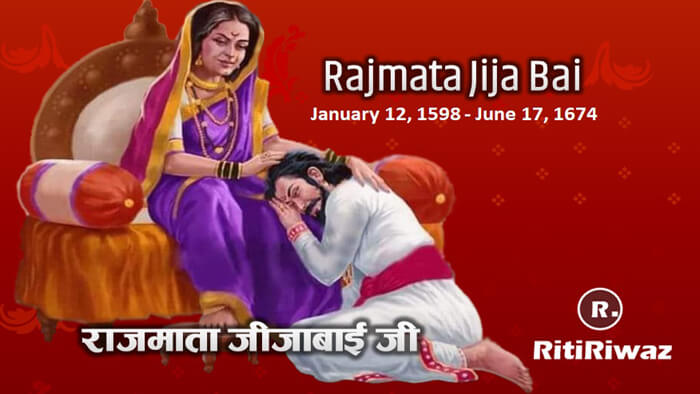
Jijabai is also known as Rajmata Jijabai , mother of Chhatrapati Shivaji Maharaj, founder of the Maratha kingdom. The mother of Shivaji , who was the protector of the country as well as religion. She was the guide who shaped his mind from his early years. She was the embodiment of self-respect. That great mother suffered in silence and became a source of inspiration to her heroic son.
The true importance of a mother in an individual’s life can be judged from the fact that while on one hand, she has been to be the first guru, on the other hand, the very heaven is said beneath her holy feet. Such a mother and brave woman were Jijabai who was not only his friend, guide but also a great source of inspiration. She never lost courage and patience in case of difficulties and adversities. She imparted moral values and ideals to her son.
As a result, her son grew up to be a great protector of the Hindu society and came to be known as Chhatrapati Shivaji Maharaj.
Jijabai was born on 12 January 1598 in a village named Sindkher. Her father’s name was Lakhuji Jadhav and her mother was Mahalasabai Jadhav . Lakhuji Jadhav belonged to Deulgaon, near Sindkhed, in the present-day Buldhana district of Maharashtra. He was equally brave and ambitious and proud of his lineage. He was proud of his family and ancestry without being unduly clannish. Impresses by his enviable qualities, the Nizam made him the chief of an army. Jijabai was not only beautiful but was rich in qualities, her personality was a fine blend of her father’s courage and pride and mother’s qualities.
Jijabai was the only daughter of Lakhuji Jadhav, and as per the customs that prevailed in those days Jijabai was married at an early age (at the age of 8 years) to Shahaji Bhosle , son of Maloji Bhosle of Verul village. The wedding was held in Sindkhed on 5 Nov 1605. Jijabai was eight years old and her husband was hardly twelve years old. As per the custom of those days, Jijabai remained with her parents for several years before joining her husband.
ADVERTISEMENT
Jijabai’s father-in-law, Maloji Bhonsle, had begun his career as a shilledar serving under the command of her father, Lakhujirao Jadhav. Her father was not happy with the marriage of his daughter due to the difference in the background and status of both families.
Jijabai bore Shahaji as many as eight children (six daughters and two sons). All the daughters died in infancy and only the two sons, Sambhaji and Shivaji, reached adulthood. Sambhaji was the elder son and Shivaji was the younger. In 1630, three years after Shivaji’s birth, Jijabai received a co-wife into her household after Shahaji married Tukabai.
Shahaji was a valiant, courageous, and brave Sardar of the Marathas. He himself aspired to establish a Swaraj. Initially, he was in the service of the Nizamshahi. He tried to save the Nizamshahi from the combined forces of Adilshahi and Mughals. But he could not withstand the combined forces of Adilshahi and Mughals. After the Nizamshahi wiped out, Shahaji became a Sardar in the court of Adilshahi.
He was granted Jagir of Bengaluru and as per the terms of the treaty forced to move to Bengaluru. While Shivaji and Jijabai were at Bengaluru, Shahaji provided excellent education to Shivaji. While Sambhaji was with his father Shahaji, in Karnataka, Jijabai along with young Shivaji and a few chosen associates shifted to Pune.
In those days, a large part of Maharashtra was under the rule of Nijamshah of Ahmadnagar and Adilshah of Bijapur. These two rulers were in a constant fight with each other to prove their dominance over the parts of Maharashtra. Along with these rulers, there are Siddis along the coastline of Konkan, the Portuguese, the British, the Dutch, and the French. All these foreign invaders constantly tried to prove their dominance over Maharashtra. Due to all these factors, there was instability and insecurity in Maharashtra. The condition of the common man was miserable.
There were many great Sardars of Marathas but they were worked either for the Adishah or Nizamshah. They concerned with their own jagirs and at constant conflicts with each other. Jijabai was not happy that her husband and her father were serving under the Muslim rulers. She always had a vision for an independent kingdom. Nijamshah deceitfully murdered Jijabai’s father Lakhuji Jadhav and his sons in his royal court. This incident had a deep impact on Jijabai.
An inspiration
Jijabai was a very pious and intelligent woman with a great vision for an independent kingdom. Shivaji grew up and began his fight for freedom. At the young age of sixteen, he captured the fort of Thorangadh. Shivaji would not take any important decision without consulting his mother. Jijabai is widely credited with raising Shivaji in a manner that led to his future greatness.
She inspired Shivaji by telling stories from Ramayana, Mahabharata. Right from his childhood, Jijau would tell Shivaji about the lives of Shriram, Maruti, Shrikrishna to make him pious and patriotic. Right from his childhood, she sowed the seeds of devotion to the nation. She instilled in him many values like courage, modesty, truthfulness, fearlessness. She inspired him to the establishment of Hindavi Swaraj. In Shivaji’s spotless character and courage, Jijabai’s contribution is enormous. It was through the efforts of Jijau that Shivaji became an Ideal administrator and ruler.
Even to Shivaji companions, Jijabai was a source of inspiration, she treated them as affectionately as she did her own son. She felt very sad like a mother when brave Maratha soldiers, after fighting heroically, fell one after another sacrificing their lives for their motherland.
After the news of Shivaji’s brother Sambhaji Maharaj’s death and her husband’s death, she was completely broke and could not manage herself. She died soon after the coronation of Shivaji on June 17, 1674, in the village of Pachad. Shivaji was heartbroken by her death, she was not only a mother to Shivaji but also a source of inspiration.
Jijabai has navigated through life without assistance, She had been wedded off at the age of seven. The moment she stepped into the Bhonsale household, she absorbed and adapted to their customs and traditions. She had cemented a concrete resolution in life – to cultivate Shivaji into an exemplary king, one who would abode by the ideals of secularism, whose subjects would have sufficient to survive on and in whose kingdom, the female species would be treated with due honor and respect. She realized this cherished dream through Shivaji.
Simmi Kamboj
Related articles.

- Indian History
Indus Valley Civilization (3300 BC to 1300 BC)
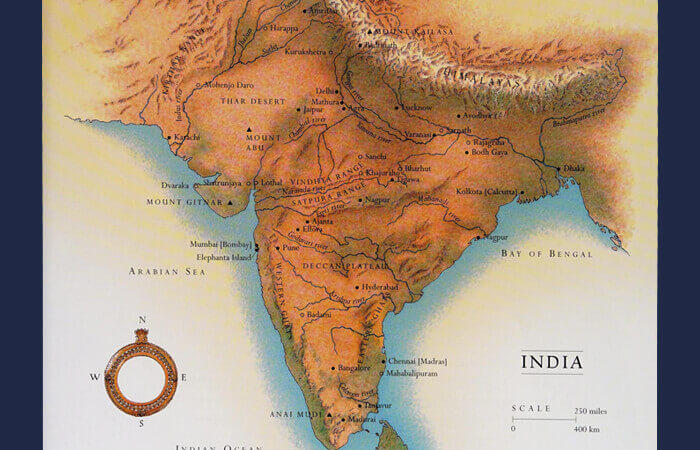
Brief Story Of India
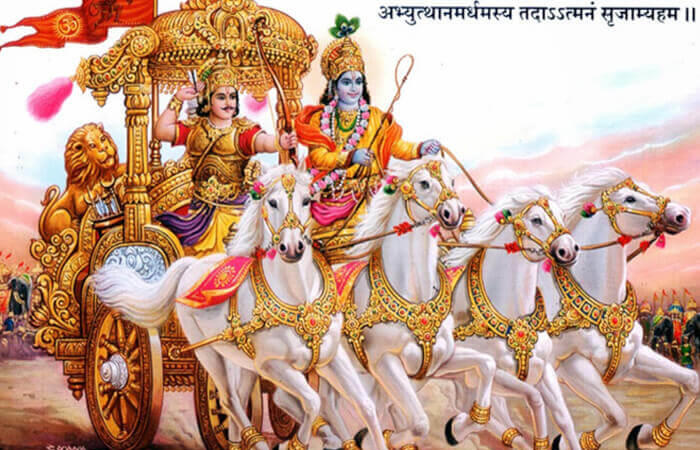
Mahabharata As A Religious Text

List of Rulers of India

Azad Hind Diwas – 21st October
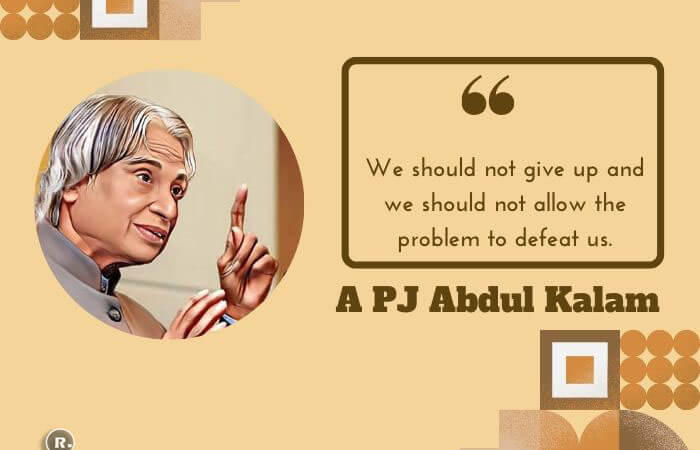
A. P. J. Abdul Kalam inspirational quotes
Ritiriwaz - riti riwaz, ritiriwaaz, riti riwaaz, culture, india, indian, traditions, rituals, custom, hindu, sikh, muslim, islam, marriage, wedding, festivals, travel, lifestyle, beauty, fashion, recipes, food, immigration, living abroad, monuments, places, palaces, forts.
- Hinduism, Indian culture, Vedic Science, Yoga, Spirituality, India

Rajmata Jijabai: Shivaji Maharaj’s inspiration and Hindavi Swaraj visionary
Jijabai was born to Lakhojiraje Jadhav in Sindkhed territory of Vidharbh, Maharashtra in the year 1598 A.D. She was affectionately called as ‘jiu’. Lakhojiraje Yadav was a Yadava, traditionally the rules of Devgiri. So, Jijau was actually the princess of Devgiri. But Lakhojiraje, along with his three sons accepted to be chieftains in the Sultan’s military. This was something that irked Jijau.
Righteous anger that fuelled Jijabai
Maharashtra was so subjugated that Brahmins would go to the Sultan to settle their disputes like, ‘Who should proffer the offerings in a religious ritual?’ The Sultan’s army would often abduct the wives of the local Kshatriyas, and they would meekly offer bribes to have their wives back. In a state where Brahmins and Kshatriyas had discarded Dharma (righteousness) and valour, nothing much could be expected of the others ! Jijau would seeth with fury at the manner in which the Hindus were being treated by the invaders. Thus, right from the childhood, she developed an intense hatred towards the invaders who had used every ploy to humiliate Hindus.
Post marriage, Jijau’s love for Dharma unites two warring clans against the invaders
Jijau got married to the most valorous general of the Sultan’s army, Shahajiraje Bhosale. Thereafter, she lived in Pune. Once, when all the Maratha sardars had come together, an elephant belonging to Khandagle suddenly became violent and went on a rampage. In the ensuing chaos, the Sardars used weapons which wounded the elephant. Unfortunately, this led to a misunderstanding between the Bhosales and the Jadhavs who took up arms against each other. Petty hostilities between the Maratha sardars flared up. Jijau and Shahaji had to witness their near and dear ones die. They earnestly wanted both the families to forgo bitterness of the past and rise above personal ego; put an end to the hostility between the two families and fight the foreign invaders and establish Hindu Kingdom. But the Maratha Sardars were hardly convinced by the noble thoughts.
Jijau’s patriotic words that force her father to introspect on the petty clashes
The Nizam had sent Lakhojiraje along with his army to Junnar to capture Shahajiraje. As Jijau was pregnant, it was not possible for her to travel to Pune on horseback. So, Shahjiraje placed Jijau under the care of Vishwasrao and Vaidhyaraj Nirgudkar (a doctor) in the Shivneri fort, and proceeded to Pune. Meanwhile Lakhojiraje reached Junnar and met his daughter at Shivneri fort after many years.
Jijau said to her father, ‘Marathas are fighting with each other for sake of mere ego and greed. If their valorous swords unite, foreign invaders will be vanquished in no time. It is a disgrace to be working under invaders for your livelihood, you must give it up’. Jijau’s intense patriotism and love for Dharma touched her father. Her earnest thought compelled Lakhojiraje to introspect. When he met Shahajiraje at the foothills of Shivneri, Lakhojiraje was pacified and that put an end to the hostility between Jadhavs and Bhosales forever.
Jijau, who always kept the flame of vengeance burning, through hardship !
Mahabat Khan, a Mughal general, abducted Godavaribai in broad daylight. Kheloji made no efforts to rescue his wife; but Shahajiraje promptly rescued his sister-in-law Godavaribai from Mahabat Khan and in due course of time killed Mahabat Khan who had fled.
Nizam called Jijau’s father, Lakhojiraje and her three brothers in his royal court unarmed and killed them deceitfully. This callous event tore Jijau’s heart apart. Her maternal family was ruined, but she did not forgo her yearning for ‘Swaraj’.
Pune destroyed under Adilshah’s orders
On Adilshah’s orders, Rairao attacked Pune (Shahaji’s territory) and burnt it to ashes, committed innumerable atrocities on the common man and killed many, destroyed the fields and houses. Pune, known as ‘Punyabhumi’ was sullied by the marauding forces.
These devastating incidents, occuring one after another, made a deep impact on Jijau who was residing at Shivneri. She was unable to endure this situation and felt like forsaking her life, but she consoled herself, did not lack composure and kept the flame of vengeance burning !
Prayers offered by Jijau prior to Shivaji’s birth and her longings during pregnancy
Jijau would earnestly pray to Bhavanimata ‘To destroy the villainous and for the protection of the Nation and Dharma, bless me with a son like Shri Ram or a daughter like Goddess Durga who would vanquish the enemies’.
Jijau would feel like wielding a sword, sit on a tiger and slay the enemies. She would often dream of Dharmik war and establishment of Ramrajya.
Jijau, an ideal mother who instilled values like patriotism and love for Dharma in Shivaji
Shivaji was born on Vaishakh Shukla Paksha Trutiya (1627 A.D.) at Shivneri fort. Right from his childhood, Jijau would tell Shivaji about the lives of Shriram, Maruti, Shrikrishna and also from Mahabharat and Ramayana to make him pious and patriotic. Thus, she molded him into an ideal ruler by sowing seeds of devotion towards the nation and Dharma. She was not only a mother to Shivaji, but also a great source of inspiration.
Personal Life
When Jijau went to stay in Pune along with Shivaji, she founded Kasbapeth Ganapati temple and renovated the Tambdi Jogeshwari and Kevereshwar temple. Besides being a patron of temples, Jijau listened to bhajan-kirtans by Saints, studied Sanskrut scriptures and religiously performed the vowed religious observances. She was a chaste wife and dutiful mother. Although she was religiously inclined, her devotion was above rituals. She had lot of merit that she gathered by abiding to Dharma in her daily life. This gave her immense strength to face difficult situations.
She had a strong faith that she was blessed by Goddess Bhavani and Mahadev. She always backed her valorous husband and son fearlessly and resolutely. When her husband or son would be in perilous situations, she would ardently pray to Bhavanimata night and day, for their protection and safe return. She strongly believed that our efforts bring success to our doorstep only with the grace of God.
An ideal Hindu woman
Jijau played all the roles in her life such as daughter, sister, wife, daughter-in-law, sister-in-law, mother, mother-in-law, grandmother just as the scriptures have mentioned. She was loved and respected by all her family members and looked upon as the support system in the family. In all aspects, she was an ideal Hindu woman. Entire Hindu community is grateful to God for having set an example before us in the form of Rajmata Jijau. A prayer unto the divine feet of Bhavanimata and Shambu Mahadev that, ‘May all Hindu women be inspired by Jijau to be ideal women !’
Jijau – an ideal Queen Mother !
Jijau was adept in warfare, possessing skills like horse riding, as well as mastery over the sword. Wielding a sword, she had decided to declare war against Siddi Jauhar to rescue Shivaji from the encircled fort of Panhala.
The Mughal commander Afzal Khan had killed Jijau’s elder son, Sambhajiraje in a military expedition of Kanakgiri by firing a cannon deceitfully. Later Afzal Khan set his sights on capturing Shivaji Maharaj. In this endeavour, he was unstoppable; destroying temples, idols of Deities, burning fields and inhumanly murdering people, as he was headed swiftly towards Rajgad. In this situation, if Shivaji Maharaj was to clash with Afzal Khan’s army, the Maratha army’s defeat was inevitable. Also if Shivaji was to meet Afzal Khan to sign a treaty, he would certainly not return. So, Shivaji’s sardars and his learned ministers advised him to move to a safe place, away from Afzal Khan. But, Jijau ordered Shivaji to meet Afzal Khan and slay him and display the Maratha valour to the world.
An efficient administrator
Jijamata would keep a close watch on socio-political affairs of the state and in times of need would efficiently handle the administration.
Shivaji Maharaj was trapped for four months when Siddi Jauhar had besieged Panhala fort. Jijau had shouldered the responsibility of Swaraj then. Till Shivaji escaped from the besieged fort, Jijau led the Marathas who were fighting Shaistakhan thus protecting Swaraj.
While proceeding to Agra, Shivaji Maharaj entrusted Swaraj in the safe hands of Jijau. Shivaji Maharaj’s imprisonment by Aurangazeb did not deter Jijau. Mughals from South, armies of Adilshah and Kutubshah, British and Portuguese invaders in Konkan and Gomantak (Goa) and vast army of Siddi Jauhar in Murud Janjira all had trained their greedy eyes on the Hindavi Swaraj. Jijau, though aged, protected her people from these enemies for more than 8 months. Beyond this, she accomplished completion of Sindudurg fort, recaptured a fort from the enemies, attended to problems of the subjects and showed her efficiency in governing.
She promptly delivered justice to her subjects to settle numerous problems related to their family and state administration and well as social, religious and financial issues. She was well versed in scriptures, strong, principled and unbiased and so, she was able to deliver perfect and Dharma abiding justice. As the culprits were duly punished, her subjects looked upon her as a ray of hope and were blessed with Dharmrajya / Ramrajya.
She never distanced herself from her subjects to enjoy pleasures as Rajmata or Queen mother. She was always a responsible mother of a responsible king. She was the pillar of swaraj.
Her decisiveness and perceptive nature was so valuable and par excellence that Shahjiraje and Shivaji Maharaj used to value her opinion while taking major political decision. She was extremely good at planning strategies and war tactics.
Shahajiraje signed the treaty of Mahul and was compelled to leave Maharashtra and go to Karnataka with his elder son. Although this incident scattered her family and uprooted Swaraj, Jijabai was steady. Jijau stayed back in Maharashtra under the pretext of taking care of Pune and Supe Paraganas given by Adil Shah to Shahjiraje and brought up Shivaji as an ideal son.
She taught her grandson Sambhaji, Urdu and Persian, to help understand the enemy’s plans and strategies.
Shivaji Maharaj lost many of his territories and 23 forts to Raje Jaisingh in the treaty of Purandar, but he had a narrow escape from the clutches of Mughals. He did not let the enemy wreck Swaraj completely. Jijau expressed her amazement over Shivaji’s commendable achievement. Her positive approach encouraged Shivaji and he set about re-establishing swaraj with a renewed enthusiasm.
As Jijau was Shahjiraje’s wife and Chatrapati Shivaji Maharaj’s mother, she was the queen and Rajmata too. As her prime concern was well-being of her subjects, she always gave priority to her duties as a queen or rajmata rather than just emotional bondages as a wife or a mother.
Hindus were oppressed under the barbaric atrocities of the Mughals in north India and the AdilShahs, KutubShahs in south India. Shivaji Maharaj, along with his mavlas was trying to reign in these demons. Shivaji Maharaj was the lone survior among Jijau’ sons and he too had to face many life threatening odds. But that did not deter Jijau who braved all this and blessed Shivaji in all his endeavours. Shahjiraje’s death shattered Jijau but she endured it despite her advanced age. She refrained from committing sati for the sake of swaraj. She overcame grief and helped Shivajiraje by guiding him in the administration.
Barely 12 days after witnessing the golden moment of Shivaji’s coronation Jijau breathed her last in Pajad 1674. She devoted her entire life for swaraj and set a personified example of what an ideal Hindu women should be like, in the form of Rajmata Jijau.
Jijamata had multi-faceted qualities like intense yearning, faith, determination, patience, sense of respect towards her Dharma, selflessness, warrior attitude, broad-mindedness, fearlessness, leadership, courage, war strategies, sacrificing attitude as well as a desire for victory.
~ Dainik Sanatan Prabhat
You may also like

Rama and Sita: The Enduring Legacy of Their Love Story in Indian History and Culture

Set Hindu Temples free from Government Interference

How Ayurveda Pioneered Smallpox Inoculation
Sanskriti calendar 2024.

Search the website
Like us on facebook.
Get daily updates via Email
Enter your email address:, recent posts.

Navratri Series – Day 9: Goddess Siddhidatri – The Bestower of Supernatural Powers
Celebrate the conclusion of Navratri with Goddess Siddhidatri on Day 9. Learn about her powers to bestow siddhis and her role in achieving spiritual enlightenment. #Navratri2024 #GoddessSiddhidatri #SpiritualJourney

Navratri Series – Day 8: Goddess Mahagauri – The Beacon of Purity and Serenity
Day 8 of Navratri is dedicated to Goddess Mahagauri, known for her purity and tranquility. Discover how she symbolizes cleanliness and moral integrity, offering peace and renewal to all.

Navratri Series – Day 7: Goddess Kalaratri – The Fierce Protector
Explore the might and mystique of Goddess Kalaratri on Day 7 of Navratri. Learn about her role as the destroyer of darkness and her powerful protection against evil.

Navratri Series – Day 6: Goddess Katyayani – The Warrior of Righteousness
“Discover the powerful essence of Goddess Katyayani on Day 6 of Navratri. Learn how she embodies courage and fights for righteousness, symbolizing victory over evil.

Navratri Series – Day 5: Goddess Skandamata – The Mother of Wisdom and Courage
Day 5 of Navratri is dedicated to Goddess Skandamata, embodying maternal love and warrior strength. Discover how she imparts wisdom and courage in our lives.

Sanskriti comes from the Sanskrit root “kr” which means to do or to make prefix “sam” is applied before it to convey a sense of embellishment. It means actions done for the holistic refinement and perfection all the potentialities within a human being.
Important Links
“The term “Rishi” in Sanskrit originates from a root that means “To See.” Rishis, quite literally, “see” truths that are unveiled to them in elevated states of consciousness. .These are recorded in Sacred texts called Upanishads , Vedas etc. The wisdom imparted by ancient Rishis has not only enriched the realm of inner science but has also played a pivotal role in shaping and advancing modern scientific understanding. Let us Explore……
Sanskriti Social
Copyright © 2024. Sanskriti Magazine
Copyright © 2024. All rights reserved.

Rajmata Jijabai : Shivaji Maharaj’s inspiration and Hindavi Swaraj visionary
Jijabai was Shahjiraje’s wife and Chatrapati Shivaji Maharaj’s mother, she was the queen and Rajmata too. She moulded him into an ideal ruler by sowing seeds of devotion to the nation and Dharma. She was not only a mother to Shivaji, but also a source of inspiration. She had a strong faith that she was blessed by Goddess Bhavani and Mahadev. She strongly believed that our efforts bring success to our doorstep only with the grace of God. Entire Hindu community is grateful to God for having set an example before us in the form of Rajmata Jijabai.
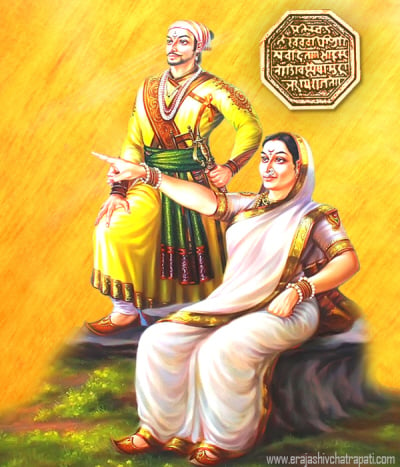
1. Early years of Jijabai
Jijabai was born to Lakhojiraje Jadhav in Sindkhed territory of Vidharbh, Maharashtra in the year 1598 A.D. She was affectionately called as ‘jiu’. Lakhojiraje Yadav was a Yadava, traditionally the rules of Devgiri. So, Jijabai was actually the princess of Devgiri. But Lakhojiraje, along with his three sons accepted to be chieftains in the Sultan’s military. This was something that irked Jijabai.
1A. Righteous anger that fuelled Jijabai
Maharashtra was so subjugated that Brahmins would go to the Sultan to settle their disputes like, ‘Who should proffer the offerings in a religious ritual?’ The Sultan’s army would often abduct the wives of the local Kshatriyas, and they would meekly offer bribes to have their wives back. In a state where Brahmins and Kshatriyas had discarded Dharma (righteousness) and valour, nothing much could be expected of the others ! Jijabai wold seeth with fury at the manner in which the Hindus were being treated by the invaders. Thus, right from the childhood, she developed an intense hatred towards the invaders who had used every ploy to humiliate Hindus.
2. Post marriage, Jijabai’s love for Dharma unites two warring clans against the invaders
2a. shahaji and jijabai’s intense desire to end the hostilities between the jadhavs and bhosales.
Jijabai got married to the most valorous general of the Sultan’s army, Shahajiraje Bhosale. Thereafter, she lived in Pune. Once, when all the Maratha sardars had come together, an elephant belonging to Khandagle suddenly became violent and went on a rampage. In the ensuing chaos, the Sardars used weapons which wounded the elephant. Unfortunately, this led to a misunderstanding between the Bhosales and the Jadhavs who took up arms against each other. Petty hostilities between the Maratha sardars flared up. Jijabai and Shahaji had to witness their near and dear ones die. They earnestly wanted both the families to forgo bitterness of the past and rise above personal ego; put an end to the hostility between the two families and fight the foreign invaders and establish Hindu Kingdom. But the egoistic Maratha Sardars were hardly convinced by the noble thoughts.
2b. Jijabai’s patriotic words that force her father to introspect on the petty clashes
The Nizam had sent Lakhojiraje along with his army to Junnar to capture Shahajiraje. As Jijabai was pregnant, it was not possible for her to travel to Pune on horseback. So, Shahjiraje placed Jijabai under the care of Vishwasrao and Vaidhyaraj Nirgudkar (a doctor) in the Shivneri fort, and proceeded to Pune. Meanwhile Lakhojiraje reached Junnar and met his daughter at Shivneri fort after many years.
Jijabai said to her father, ‘Marathas are fighting with each other for sake of mere ego and greed. If their valorous swords unite, foreign invaders will be vanquished in no time. It is a disgrace to be working under invaders for your livelihood, you must give it up’. Jijabai’s intense patriotism and love for Dharma touched her father. Her earnest thought compelled Lakhojiraje to introspect. When he met Shahajiraje at the foothills of Shivneri, Lakhojiraje was pacified and that put an end to the hostility between Jadhavs and Bhosales forever.
3. Jijabai, who always kept the flame of vengeance burning, through hardship !
3a. shahajiraje’s sister-in-law abducted by mahabat khan.
Mahabat Khan, a Mughal general, abducted Godavaribai in broad daylight. Kheloji made no efforts to rescue his wife; but Shahajiraje promptly rescued his sister-in-law Godavaribai from Mahabat Khan and in due course of time killed Mahabat Khan who had fled away.
3b. Nizam deceitfully killing Jijabai’s father and three brothers
Nizam called Jijabai’s father, Lakhojiraje and her three brothers in his royal court unarmed and killed them deceitfully. This callous event tore Jijabai’s heart apart. Her maternal family was ruined, but she did not forgo her yearning for ‘Swaraj’.
3c. Pune destroyed under Adilshah’s orders
On Adilshah’s orders, Rairao attacked Pune (Shahaji’s territory) and burnt it to ashes, committed innumerable atrocities on the common man and killed many, destroyed the fields and houses. Pune, known as ‘Punyabhumi’ was sullied by the marauding forces.
These devastating incidents, occuring one after another, made a deep impact on Jijabai who was residing at Shivneri. She was unable to endure this situation and felt like forsaking her life, but she consoled herself, did not lack composure and kept the flame of vengeance burning !
4. Prayers offered by Jijabai prior to Shivaji’s birth and her longings during pregnancy
4a. prayers offered by jijabai to bhavanimata.
Jijabai would ernestly pray to Bhavanimata ‘To destroy the villainous and for the protection of the nation and Dharma, bless me with a son like Shri Ram or a daughter like Goddess Durga who would vanquish the enemies.
4b. Longings during pregnancy
Jijabai would feel like wielding a sword, sit on a tiger and slay the enemies. She would often dream of Dharmik war and establishment of Ramrajya.
5. Jijabai, an ideal mother who instilled values like patriotism and love for Dharma in Shivaji
Shivaji was born on Vaishakh shukla Paksha Trutiya (1627 A.D.) at Shivneri fort. Right from his childhood, Jijabai would tell Shivaji about the lives of Shriram, Maruti, Shrikrishna and also from Mahabharat and Ramayana to make him pious and patriotic. Thus, she moulded him into an ideal ruler by sowing seeds of devotion to the nation and Dharma. She was not only a mother to Shivaji, but also a source of inspiration.
6. Personal Life of Jijabai
6a. how dharmacharan helped jijabai face difficult situations courageously.
When Jijabai went to stay in Pune along with Shivaji, she founded Kasbapeth Ganapati temple and renovated the Tambdi Jogeshwari and Kevereshwar temple. Besides being a patron of temples, Jijabai listened to bhajan-kirtans by Saints, studied Sanskrut scriptures and religiously performed the vowed religious observances. She was a chaste wife and dutiful mother. Although she was religiously inclined, her devotion was above rituals. She had lot of merit that she gathered by abiding to Dharma in her daily life. This gave her immense strength to face difficult situations.
6B. Jijabai’s undaunted faith in God blessed her with success
She had a strong faith that she was blessed by Goddess Bhavani and Mahadev. She always backed her valorous husband and son fearlessly and resolutely. When her husband or son would be in perilous situations, she would ardently pray to Bhavanimata night and day, for their protection and safe return. She strongly believed that our efforts bring success to our doorstep only with the grace of God.

6C. Jijabai – An ideal Hindu woman
Jijabai played all the roles in her life such as daughter, sister, wife, daughter-in-law, sister-in-law, mother, mother-in-law, grandmother just as the scriptures have mentioned. She was loved and respected by all her family members. She was looked upon as the support system in the family. In all aspects, she was an ideal Hindu woman. Entire Hindu community is grateful to God for having set an example before us in the form of Rajmata Jijabai. A prayer unto the divine feet of Bhavanimata and Shambu Mahadev that, ‘May all Hindu women be inspired by Jijabai to be ideal women !’
7. Jijabai – an ideal Queen Mother !
7a. a warrior par excellence.
Jijabai was adept in warfare, possessing skills like horse riding, as well as mastery over the sword.
7B. Valorous Ranaragini
7B 1. Jijabai, wielding a sword, had decided to declare war against Siddi Jauhar to rescue Shivaji from the encircled fort of Panhala
7B 2. Jijabai the inspiration behind Afzal Khan’s slaying : The Mughal commander Afzal Khan had killed Jijabai’s elder son, Sambhajiraje in a military expedition of Kanakgiri by firing a cannon deceitfully. Later Afzal Khan set his sights on capturing Shivaji Maharaj. In this endeavour, he was unstoppable; destroying temples, idols of Deities, burning fields and inhumanly murdering people, as he was headed swiftly towards Rajgad. In this situation, if Shivaji Maharaj was to clash with Afzal Khan’s army, the Maratha army’s defeat was inevitable. Also if Shivaji was to meet Afzal Khan to sign a treaty, he would certainly not return. So, Shivaji’s sardars and his learned ministers advised him to move to a safe place, away from Afzal Khan. But, Jijabai ordered Shivaji to meet Afzal Khan and slay him and display the Maratha valour to the world.
7D. An efficient administrator
Jijamata would keep a close watch on socio-political affairs of the state and in times of need would efficiently handle the administration.
7D 1. Leading the Marathas who were fighting Shaistakhan : Shivaji Maharaj was trapped for four months when Siddi Jauhar had besieged Panhala fort. Jijabai had shouldered the responsibility of Swaraj then. Till Shivaji escaped from the besieged fort, Jijabai led the Marathas who were fighting Shaistakhan thus protecting Swaraj.
7D 2. Protecting Swaraj even in her advanced age : While proceeding to Agra, Shivaji Maharaj entrusted Swaraj in the safe hands of Jijabai. Shivaji Maharaj’s imprisonment by Aurangazeb did not deter Jijabai. Mughals from South, armies of Adilshah and Kutubshah, British and Portuguese invaders in Konkan and Gomantak (Goa) and vast army of Siddi Jauhar in Murud Janjira all had trained their greedy eyes on the Hindavi Swaraj. Jijabai, though aged, protected her people from these enemies for more than 8 months. Beyond this, she accomplished completion of Sindudurg fort, recaptured a fort from the enemies, attended to problems of the subjects and showed her efficiency in governing.
7E. Judicious nature
She promptly delivered justice to her subjects to settle numerous problems related to their family and state administration and well as social, religious and financial issues. She was well versed in scriptures, strong, principled and unbiased and so, she was able to deliver perfect and Dharma abiding justice. As the culprits were duly punished, her subjects looked upon her as a ray of hope and were blessed with Dharmrajya / Ramrajya.
7F. Pillar of swaraj
She never distanced herself from her subjects to enjoy pleasures as Rajmata or Queen mother. She was always a responsible mother of a responsible king. She was the pillar of swaraj.
7G. Excellent political and war advisor
Her decisiveness and perceptive nature was so valuable and par excellence that Shahjiraje and Shivaji Maharaj used to value her opinion while taking major political decision. She was extremely good at planning strategies and war tactics.
7H. Visionary
7H 1. Singlehandedly bringing up Shivaji in the absence of Shahjiraje : Shahajiraje signed the treaty of Mahul and was compelled to leave Maharashtra and go to Karnataka with his elder son. Although this incident scattered her family and uprooted Swaraj, Jijabai was steady. Jijabai stayed back in Maharashtra under the pretext of taking care of Pune and Supe Paraganas given by Adil Shah to Shahjiraje and brought up Shivaji as an ideal son.
7H2. She taught her grandson Sambhaji, Urdu and Persian, to help understand the enemy’s plans and strategies.
7H3. Jijabai encouraged Shivaji after the treaty of Purandar and Shivaji restablished Hindavi Swaraj : Shivaji Maharaj lost many of his territories and 23 forts to Raje Jaisingh in the treaty of Purandar, but he had a narrow escape from the clutches of Mughals. He did not let the enemy wreck Swaraj completely. Jijabai expressed her amazement over Shivaji’s commendable achievement. Her positive approach encouraged Shivaji and he set about re-establishing swaraj with a renewed enthusiasm.
7I. An ideal queen, whose priority lay in her subjects
As Jijabai was Shahjiraje’s wife and Chatrapati Shivaji Maharaj’s mother, she was the queen and Rajmata too. As her prime concern was well-being of her subjects, she always gave priority to her duties as a queen or rajmata rather than just emotional bondages as a wife or a mother.
7I 1. Jijabai, the force behind Shivaji’s Hindavi Swaraj : Hindus were oppressed under the barbaric atrocities of the Mughals in north India and the AdilShahs, KutubShahs in south India. Shivaji Maharaj, along with his mavlas was trying to reign in these demons. Shivaji Maharaj was the lone survior among Jijabai’ sons and he too had to face many life threatening odds. But that did not deter Jijabai who braved all this and blessed Shivaji in all his endeavours.
7I2. Jijabai enduring the grief of her husband’s death and contributing to swaraj : Shahjiraje’s death shattered Jijabai but she endured it despite her advanced age. She refrained from committing sati for the sake of swaraj. She overcame grief and helped Shivajiraje by guiding him in the administration.
Gratitude and prayer
Barely 12 days after witnessing the golden moment of Shivaji’s coronation Jijabai breathed her last in Pajad 1674. She devoted her entire life for swaraj. Obeisance to God for setting a personified example of what an ideal Hindu women should be like, in the form of Rajmata Jijabai. ‘Jijamata had multi-faceted qualities like intense yearning, faith, determination, patience, sense of respect towards her Dharma, selflessness, warrior attitude, broad-mindedness, fearlessness, leadership, courage, war strategies, sacrificing attitude as well as a desire for victory. A prayer unto the Divine Feet that may all Hindus develop these abilities.
Source : Dainik Sanatan Prabhat
Related Articles
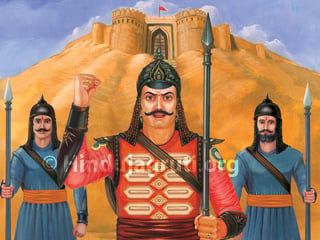
Leave a Comment Cancel reply
Save my name, email, and website in this browser for the next time I comment.
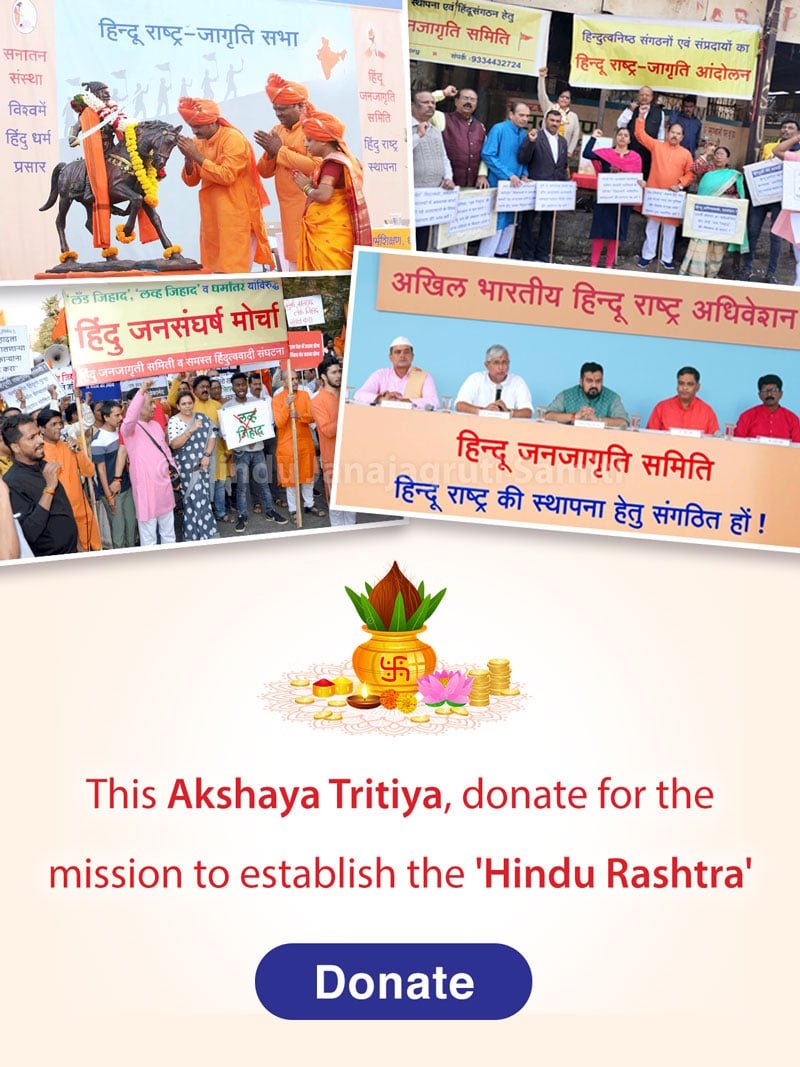
- Bihar Board
SRM University
Wb 10th result 2024.
- WB Board Result 2024
- Punjab Board Result 2024
- JAC Board Result 2024
- CG Board Result 2024
- UK Board Result 2024
- Karnataka Board Result 2024
- Shiv Khera Special
- Education News
- Web Stories
- Current Affairs
- नए भारत का नया उत्तर प्रदेश
- School & Boards
- College Admission
- Govt Jobs Alert & Prep
- GK & Aptitude
- general knowledge
Rajmata Jijau Punyatithi 2021: All about Jijabai and Chhatrapati Shivaji Maharaj
Rajmata jaijau was the mother of chhatrapati shivaji maharaj and the pillar behind the establishment of the maratha empire. know about the formidable lady here and her contributions to the marathas on her death anniversary or punyatithi. .
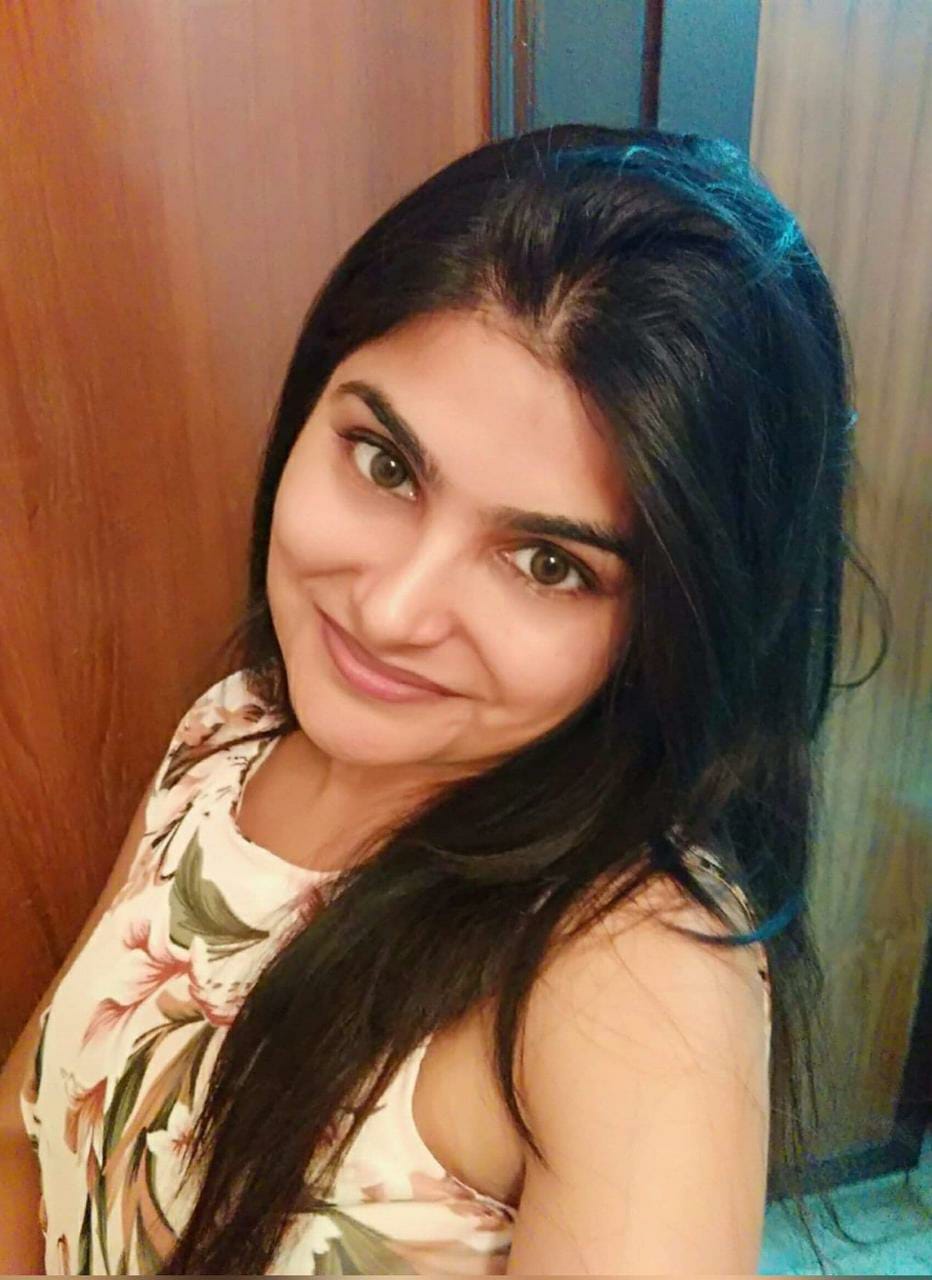
Rajmata Jijau Punyatithi: Why in the News?
Rajmata Jijau Punyatithi or death anniversary is observed on June 17. She was the mother of Chhattrapati Shivaji Maharaj and also known as Rajmata Jijabai. She was an administrator, a warrior and a mother. Know all about her and her contribution to the Maratha empire here.
राजमाता जिजाऊ यांच्या स्मृतिदिनानिमित्त विनम्र अभिवादन..! #rajmatajijau pic.twitter.com/JRHPLbITjG — Nitin Dinkar (@NitinSDinkar) June 17, 2021
Uddhav Thackeray also tweeted in her honour. Take a look
🙏🏼 pic.twitter.com/I8j6t6k4yX — ShivSena - शिवसेना (@ShivSena) June 17, 2021
त्यांनी अखंड भारतवर्षाला मातृभूमीच्या रक्षणाचा मंत्र दिला, मनामनात स्वाभिमान जागविला. या त्यांच्या कर्तृत्वाला मानाचा मुजरा आणि स्वराज्य जननी राजमाता जिजाऊ माँ साहेब यांना पुण्यतिथीनिमित्त त्रिवार अभिवादन🙏🏼 — Office of Uddhav Thackeray (@OfficeofUT) June 17, 2021
Who was Rajmata Jijau?
- Rajmata Jijau or Jijabai was born on January 12, 1598 in Deulgaon near Sindkhed in Maharashtra. She was the wife of Shahji Bhonsale, the son of Maloji Bhonsale of Verul village.
- She was a determined woman with strong character and beliefs.
- She was the mother of eight children including six daughters and two sons.
- Her eldest son was killed by Afzal Khan
- After Shahji died, Rajmata Jijau moved to Poona.
- Rajmata Jijau managed the state affairs when Shivaji went to Agra in 1666.
- She was the reason for the Chhattrapati's rise and establishment of the Maratha empire.
- She died on 17th June, 1674 but could not see her son Shivaji's coronation.
- Jijau was a warrior and had a strong character.
Rajmata Jijau: Married Life
Chhatrapati shivaji maharaj.
- Shivaji Bhonsale I, was also called Chhatrapati Shivaji Maharaj.
- He was an Indian ruler, son of Jijabai and Shahji Bhonsale.
- He was thus the member of the Bhonsle Maratha clan.
- Shivaji declined the Adilshahi sultanate of Bijapur that became the reason for the genesis of the Maratha Empire.
- In 1674, he was formally crowned the Chhatrapati of the Maratha Kingdom at Raigad. Sadly Jijabai, his mother was not alive to witness her son rise to power.
- Shivaji was born on February 19, 1630 and breathed his last on April 3, 1680.
- He was the ruler who rose his voice against the Muslim rule or the Mughals in the North and Muslim Sultans of Bijapur and Golconda in the South.
- Shivaji at the age of 16 had realised his potential to rise against their oppression.
- He, in 1655 began to seize the weaker posts of Bijapur. He also killed Afzal Khan who was responsible for his brother's death by driving him into difficult mountain terrain.
When he was captured by Aurangzeb in Agra, he managed to escape along with his son camouflaged in fruit baskets in 1966. His escape changed the course of Indian history. Within two years after that he managed to not only win his lost territories but also expand his domain.
It was Jijabai's patience and early education along with her training that molded Shivaji into the ruler he became.
Get here current GK and GK quiz questions in English and Hindi for India , World, Sports and Competitive exam preparation. Download the Jagran Josh Current Affairs App .
- IPL Schedule 2024
- Fastest 50 in IPL 2024
- India T20 World Cup Squad 2024
- World Press Freedom Day 2024 Theme
- IPL 2024 Points Table
- Hanuman Jayanti 2024
- Ram Navami 2024
- Purple Cap in IPL 2024
- CBSE Board Result 2024
- wbbse.wb.gov.in Result 2024
Latest Education News
(Updated) KKR vs MI Head to Head in IPL: Check Stats, Records and Results
CBSE 10th, 12th Result 2024 Date Time LIVE: क्या आज आयेंगे सीबीएसई 10वीं, 12वीं के नतीजे? यहाँ देखें लेटेस्ट अपडेट
World Press Freedom Day 2024: 35+ Quotes, Images, Messages Related to Journalism Freedom
World Press Freedom Day 2024: Inspirational & Motivational Quotes To Share On This Day
Today’s IPL Match (03 May) - KKR vs MI: Team Squad, Match Time, Where to Watch Live and Stadium
IPL 2024: हिंदी हो या भोजपुरी इन चर्चित कमेंटेटरों के साथ आईपीएल का लें लुफ्त
Who Won Yesterday IPL Match: RR VS SRH, Match 50, Check All Details and Latest Points Table
IPL 2024 MI Players: मुंबई इंडियन्स के खिलाड़ियों की पूरी लिस्ट यहां देखें
[Current] Orange Cap and Purple Cap Holders in IPL 2024
Lok Sabha Elections 2024: लोकसभा चुनाव के तीसरे चरण के सबसे अमीर उम्मीदवार कौन है?
Fastest 50s In IPL History: किसने जड़ा है आईपीएल इतिहास का सबसे तेज़ अर्द्धशतक? देखें पूरी लिस्ट
[New Update] IPL Points Table 2024: आईपीएल 2024 अपडेटेड पॉइंट टेबल यहां देखें, राजस्थान ऑन टॉप
Purple Cap in IPL 2024: Top Players List with Most Wickets in TATA IPL
[Today] IPL 2024 Points Table: Team Rankings and Net Run Rate
India T20 World Cup 2024 Squad: ये है रोहित की ‘विराट’ टीम, किस रोल में कौन? देखें यहां
IPL 2024 Full Schedule: आईपीएल 2024 का फुल शेड्यूल,आज किस टीम का है मैच जानें यहां
Orange Cap in IPL 2024: Top Players List with Most Runs in TATA IPL
CBSE Result 2024 Date LIVE Updates: 10th, 12th Result TOMORROW? Check Expected Date and Time
VTU Results 2024 OUT at vtu.ac.in, Download UG Semester Marksheet
Picture Puzzle IQ Test: Find the cheater in the exam hall in 5 seconds!
Talk to our experts
1800-120-456-456
- Shivaji Maharaj Essay

Essay on Shivaji Maharaj
Shivaji Bhonsle, also known as Shivaji Maharaj, was considered the people’s king. His iron determination, valour, and dominance were the epitomes to follow. His courage knew no bounds. This article includes long and short Shivaji Maharaj essays for students. You can follow the historical facts and write an essay on Shivaji Maharaj on your own. Follow the format and maintain the proper sequence to score more in the exam. These essays can also be used to prepare for a Shivaji Maharaj essay writing competition.
Living for the people was a king. The fighter who strives for the wellbeing of the people by fighting against injustice. The Maratha Empire is one of the world's prestigious empires created by a leader who refused to live as a slave. Our goal in this article is to give you some insight into the life of Chhatrapati Shivaji Maharaj, the great Maratha warrior.
Chhatrapati Shivaji Maharaj was a Maratha warrior and founding ruler of the Maratha empire in western India. In India and even in other countries, he is still considered the greatest warrior of his time. An innovative military tactician and a skilful administrator, he is considered a valorous warrior. The great qualities he possessed as a leader and king helped him build the Maratha Empire into a powerful and massive power.
Note: ➤ Predict your NEET rank effortlessly with our NEET Rank Predictor 2024 !
Long Essay on Shivaji Maharaj
Shivaji Bhonsle was born in the royal family of Shahaji Bhonsle. He was a born leader and went on to establish the Maratha Empire that even terrified the mighty Mughals. Born on 16 th February 1627 in Shivneri, Shivaji was the proud son of Shahji. This Shivaji Maharaj essay in English will tell you about the glory and valour of the people’s king.
Shivaji’s mother Jijabai was also very strong in personality. She was virtuous and gave the proper education to her son to make him fearless. He grew up listening to the valour and glory of the Ramayana and Mahabharata. He also followed the teachings of these two epics but also imbibed the strong resilient features of an ideal Hindu’s character. He never learned to bow down to any force. In this Shivaji Maharaj essay, his life and achievements will be unfurled.
A Description of Shivaji Maharaj's Childhood
For the people whose lives were ruined by the Mughal Empire, the birth of Chhatrapati Shivaji Maharaj was a good omen. During the hardships of the Mughal rule, he came as a ray of hope for the people. Maharaj was born on 18th February 1630 according to the Julian calendar and on Falgun Krishna Tritiya (Falgun Krishna Tritiya) according to the Hindu calendar at Shivneri Fort, in Junnar city, near Pune district, to Shahaji Bhosale and Jijabai Bhosale. We have provided some information about Shivaji Maharaj's birthdate at the end of this article. (There are some controversies about Shivaji Maharaj's birthdate.)
During his childhood, his mother Jijamata called him "Shivba". He served the King of Bijapur during his young life. As well as being a "Jahagirdar," he lived in a certain area in Pune. Jijabai, Shivaji's mother, was a deeply religious and ambitious woman whose father was Sindkhed leader Lakhujirao Jadhav. The truth will triumph in the end, according to Shivaji, who has been taught that fighting for what is right no matter what challenges you face is the most important lesson she taught him as a child. As Shivaji was growing up, Jijamata's teachings had a profound effect on his mind.
He was encouraged by Dada Konadev to learn different warfare skills relevant to the contemporary era. His guru wanted him to survive any diverse condition by using such skills. Apart from his survival and warfare skills, he became a nationalist and the man of his words. Being a full-fledged warrior, he followed the teachings of Saint Ramdev and understood the importance of religion. This education included the importance of all religions, politics, and cultures. From the evidence of Shivaji Maharaj's essay in English of historians, you will observe that his skills and life lessons helped him to become one of the greatest leaders of India.
He quickly became adept at different life and warfare skills and entered into the reality of the world. He started to attack the enemies surrounding his kingdom and capture them one after the other to make a bigger and stronger empire. The moment his flag was hoisted in the forts of Toran and Purandar, the stories of his valour and strength reached Delhi and Agra. The rulers, whether they are tyrants or subject-loving, started to fear his name.
Adil Shah, the king of Bijapur, was afraid of his growing power. He then captured his father Shahji and imprisoned him. Learning about his father’s imprisonment, he was furious but did not lose his mind. He planned well and freed his father. This made Adil Shah even more furious. He ordered his commander Afzal Khan to plan a murder and eradicate Shivaji. Afzal acted as a friend to gain his confidence and kill him. Shivaji was one step ahead. He killed Afzal Khan by hiding a deadly dagger inside his cloak and fled.
Under his dominance and valour, the Maratha Empire grew stronger every day. He was known as a freedom fighter as he relieved commoners from the tyrants. He was considered to be anti-Muslim by many but it is not true. His two generals were Siddi and Daulat Khan. Historians suggest that his army consisted of soldiers from different races and religions. He never learned to differentiate between people in terms of caste, religion, or colour.
He focused his energy on eradicating the tyrants of the contemporary era. Most of them were Muslim rulers. He never instigated any religious war or motive to uproot a kingdom. All he did was to understand common people’s pain under the sabbatical Aurangzeb and other rulers. He freed many people and thus was given the name Chhatrapati Shivaji by his admirers.
He ruled the Maratha Empire for 27 years and created an example to follow. He then fell sick and suffered from an unknown fever for three weeks. He then succumbed to his illness and died on 3 rd April 1680 in Raigad Fort.
Short Paragraph on Shivaji Maharaj
Shivaji Bhonsle, also known as Chhatrapati Shivaji, was born on 16 th February 1627. He was the son of Shahji and Jijabai. At an early age, Shivaji got the right education from his mother and father. His indomitable spirit and intelligence were off the chart. He learned all the warfare skills alongside religious teachings. He imbibed the strong features of his character from his mother. He grew up learning everyone is equal, irrespective of caste and religion.
He grew up to be a formidable ruler and united the different kingdoms to form the Maratha Empire. His intelligence and valour made the Mughal Empire and other rulers shiver in fear. His enemy, Adil Shah wanted to kill him. He sent his commander, Afzal Khan to trick him and kill him on the spot. Shivaji was one step ahead. He hid a dagger and killed Afzal Khan and fled. He fought many battles and freed people from the tyranny of many rulers. This is why he got the name ‘Chhatrapati Shivaji’ or the people’s king. He died in 1680 due to illness.
This short and long Shivaji Maharaj essay tells us about the life and good deeds of Shivaji. We learn why he was named the people’s king. He united many kingdoms to form the Maratha Empire and wage war against the cruel rulers of then India. His valour made rulers terrified. He was intelligent enough to overcome any situation.

FAQs on Shivaji Maharaj Essay
1. Why was Shivaji called Chhatrapati?
In this Chhatrapati Shivaji Maharaj essay, you will learn that he used to uproot the tyrant rulers and free the common people. He used to think of everyone as the same. In the declining Adilshahi sultanate of Bijapur, Shivaji carved out an enclave that was the genesis of the Maratha Empire. His crowning as the Chhatrapati of Raigad in 1674 was officially recognized. Shivaji established a civil rule with an efficient administration and well-organized administrative structures.
2. Why do many think that he was Anti-Muslim?
In this Chhatrapati Shivaji Maharaj essay in English, we find that he waged war against Muslim tyrants of the Mughal Empire but he was not anti-Muslim. His two main generals were Siddi and Daulat Khan. The Indian king Shivaji Maharaj is taught to be depicted as Hindu, but he wanted independence from foreigners (swarajya). The foreigners were Muslims, but Muslim majority countries were not foreign countries. Aurangzeb was obsessed with Hinduism. Shivaji Maharaj was not anti-Muslim.
3. Among Shivaji Maharaj's achievements as a true king, what are they?
Analyzing the accomplishments of a true king and leader: As of 1645, he had conquered several forts and surrounding areas of Adil Shaha's sultanate, including Chakan, Kondana, Torana, Purandar, and Sinhgad. Soon Adil Shaha started feeling restless and threatened. As a result, Shivaji's father Shahaji was captured and imprisoned. During the release of Shivaji, Adil Shaha requested Shivaji end his campaign to conquer Adil Shaha's domains.
The year after Shahaji's death, Shivaji Maharaj renewed his conquests, acquiring the Javali valley from Chandrarao More, a Jahagiridar in Bijapur. Afzal Khan, one of Adil Shaha's powerful generals, was dispatched by Adil Shaha to conquer Shivaji.
As per Afzal Khan's plan, Shivaji Maharaj would be invited to a meeting on Pratapgad to assassinate him. Shivaji Maharaj was one step ahead of him, but he was unaware of that fact. Afzal Khan's motives were perceived by Shivaji, and they took hidden actions against him. The plan to kill Shivaji backfired for Afzal Khan when they met. This quick-witted king had no intention of being defeated.
4. Was Shivaji Maharaj's birthday controversial?
Approximately the Birthdate, Year of Shivaji Maharaj and the controversy around them.
The birth date and birth year of Shivaji Maharaj are subject to some controversy. On Falgun Krishna Tritiya, Shivaji Maharaj was born according to the Hindu calendar. On 19th February 1630, according to the Julian calendar, he was born. According to the Hindu Calendar, Shivaji Maharaj's birth date would have been between March 1 and March 30 before the Julian calendar was converted to the Gregorian calendar.
So now people who live according to the Gregorian calendar celebrate Shiva Jayanti, the birthday of Shivaji Maharaj, which has also been recognized by the Government of India, each year on 19th February. Shivaji was a Hindu warrior according to the Hindu calendar, so we should celebrate his birth anniversary as per the Hindu calendar. The fact that we get the opportunity to honour another birthday of such a distinguished king and warrior is to be commended.
5. Can you please describe the Maratha Navy briefly?
Shivaji Maharaj deemed it necessary to construct a navy when he became master of such a long coastal strip. Shivaji Maharaj realized that the one who controlled the sea was the one who possessed a navy. As a means to secure and enhance revenues derived from maritime trade and customs duties, he concentrated on building the Navy to protect himself from the Siddi's depredations and to increase the number of merchant ships and ports. Navy ships ranged in size from forty to four hundred. Among them were battleships such as the Galbat, Gurab, and Pal. The inaugural keel of a Maratha naval vessel was laid down in 1654 in a creek near Kalyan by Chhatrapati Shivaji, who recognized the importance of a strong navy. During Shivaji's reign, Maharashtra (today's Maharashtra) was dotted with numerous naval bases. Maratha forces were always aware of the Portuguese navy's strength.
- +91-7558644556

Who Was Rajmata Jijabai?
- Last Updated : 20-Mar-2023
Introduction:
About rajmata of the maratha empire:, work and life:, any suggestions or correction in this article - please click here ( [email protected] ), related posts:, aligarh movement | syed ahmad khan.
- 23/Feb/2024
Mughal Empire In The Deccan & Akbar's Deccan Policy
Fourth anglo-mysore war.
- 22/Feb/2024
Chera Dynasty Rulers - History of Medieval India
- 30/Oct/2023
Dual Government In Bengal (176
- 103553 Views
Civil Disobedience Movement
- 79203 Views
- 78027 Views
Human Values And Ethics
- 66393 Views
Thermal Pollution | Causes And
What is acid rain | causes an, aligarh movement | syed ahmad, what was the adam's regulation.

- #DidYouKnow?
- Family Trees
- Legend Says
- Narada’s Sayings
- One Word Many Meanings
- Weapons Check
- Krishna Speaks
- Pearls from the Ramayana
- Trending Now Articles
- Fact Sheets
- Kitchen Stories
- Language 101
- Religion 101
- Tools of the Trade
- Epic Battles
- Words of Wisdom
- Kings and Queens
- Today in History
- Culture Shock
- Festivals & Special Days
- In Our Part of The Country
- India’s Firsts
- Legendary Personalities
- State Stories
- Author Profiles
- Bibliographies
- Animal Stories
- Witty and Wise
- Value Series
- Manuscripts

- Shop Digital

- Medieval India
Shivaji and Jijabai
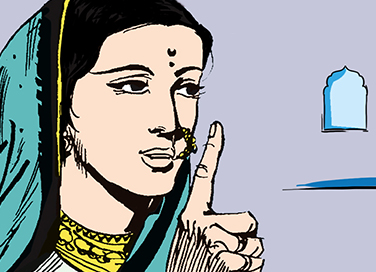
- February 19, 2020
We have heard much about the bravery of the great Maratha warrior, but do you know who instilled this sense of courage and valour in him?
Jijabai had prayed for a son to be born who could lead the Marathas one day. When her prayers were answered, she left no stone unturned to mould Shivaji into a brave warrior. Jijabai almost single-handedly brought up Shivaji, as Shivaji’s father Shahji was mostly away fighting on the battlefield.
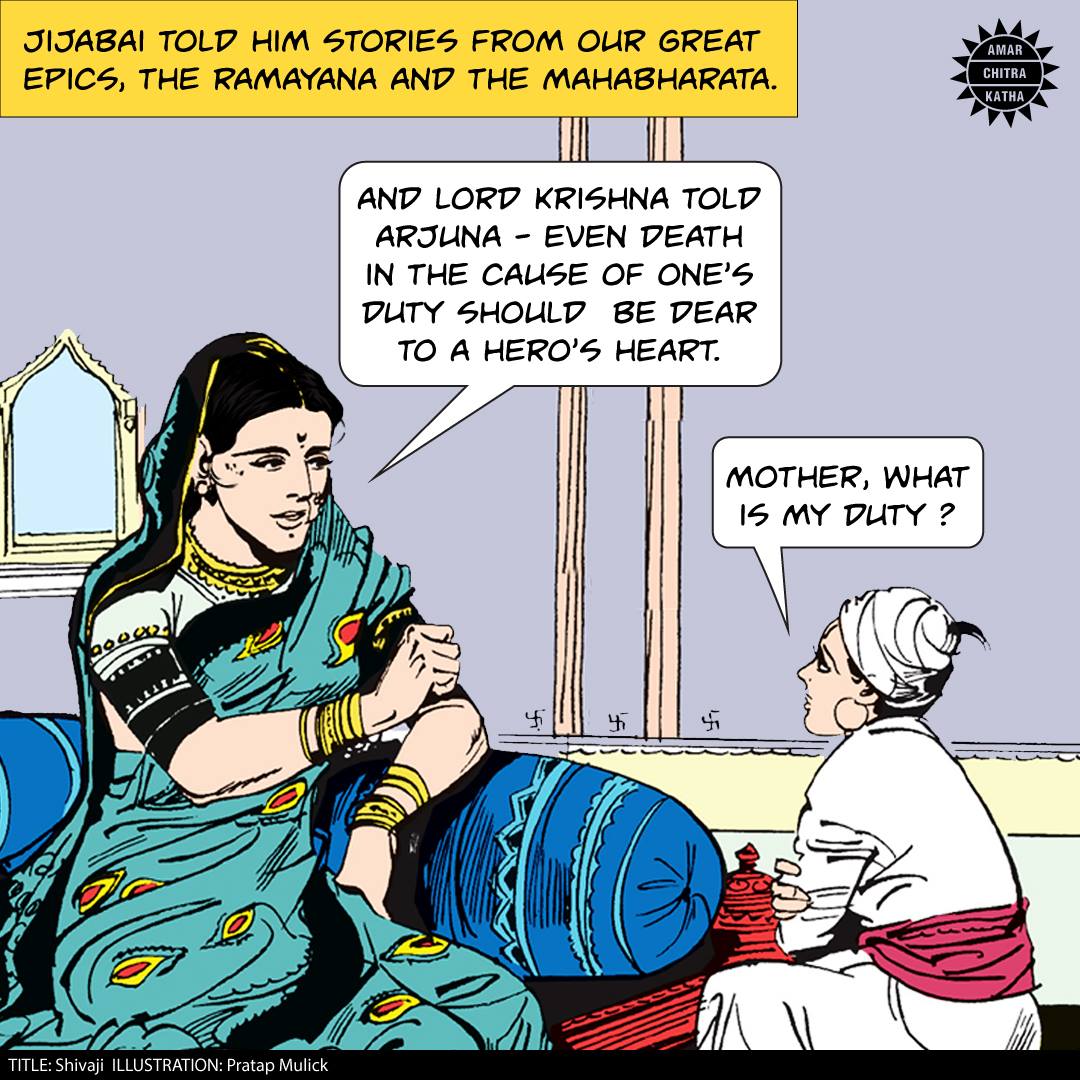
To receive more such stories in your Inbox & WhatsApp, Please share your Email and Mobile number.
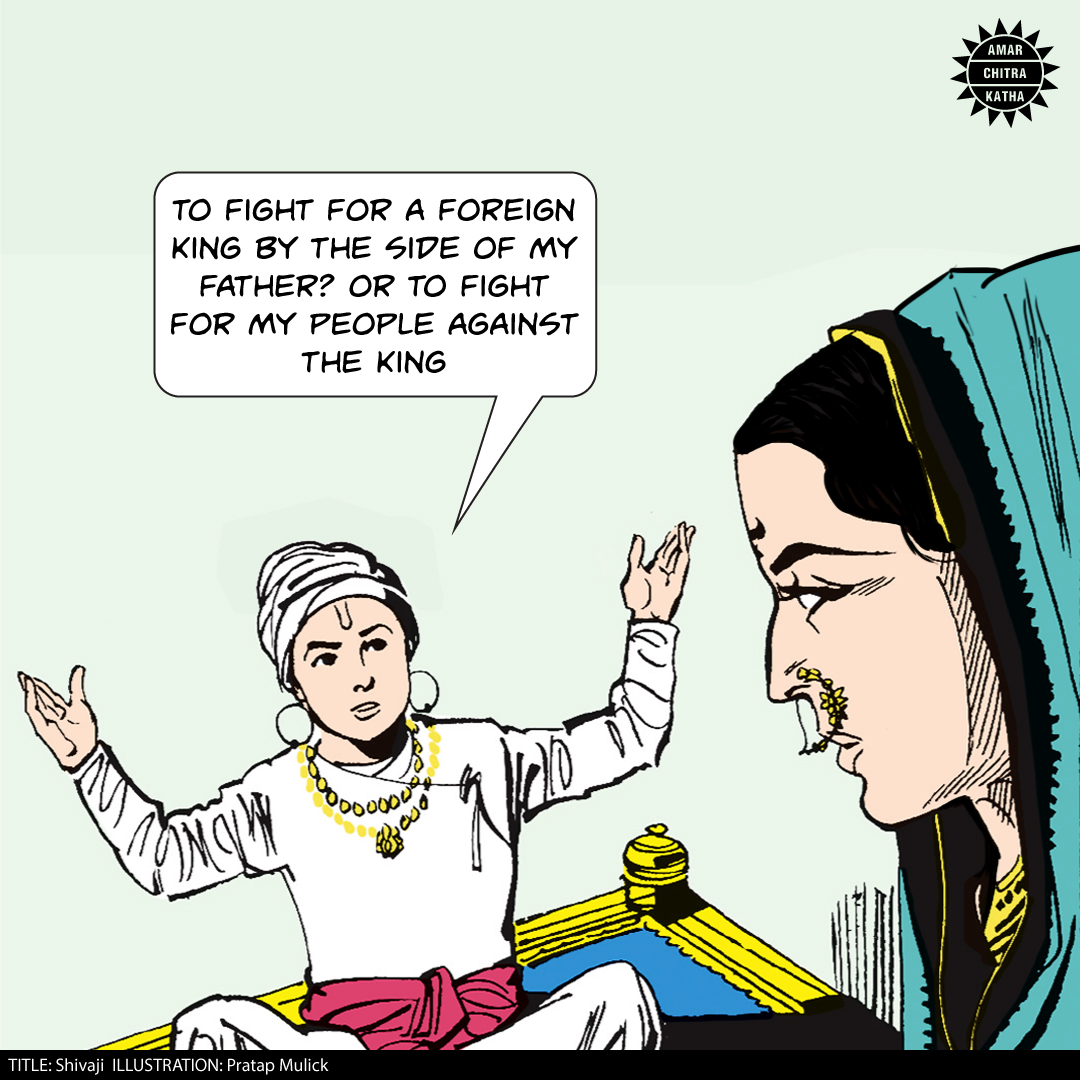
Jijabai taught Shivaji the importance of strategy, values, and dharma by telling him stories from the great epics and folklore. She taught him the art of politics and prepared him to be a just and honest ruler. She even supervised his weapon training sessions.
It was thanks to all this training from his mother that he was later able to escape from the trickiest situations with ease.
Buy Amar Chitra Katha’s Shivaji here:

Nature in the Saptaswara
The Saptaswara (the seven notes) form the basis of Indian Classical Music. Did you know that these notes are said to have originated from nature? The notes – Sa, Re, Ga, Ma, Pa, Dha, Ni – are believed to come from the sounds made by various animals. Shadja or Sa: Cry of the peacock in […]
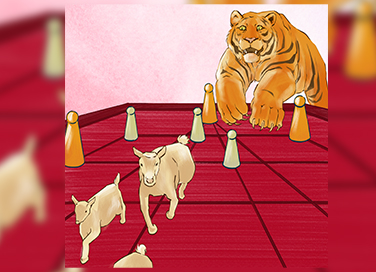
Pulijudam: The Game of Goats and Tigers
By Komal Narwani Pulijudam, or the game of Goats and Tigers, is an ancient strategic board game. It is popular in the southern states of India. Played by two players or teams, this is an asymmetric game. One player handles three tigers and the other possesses up to fifteen lambs or goats. This game of […]
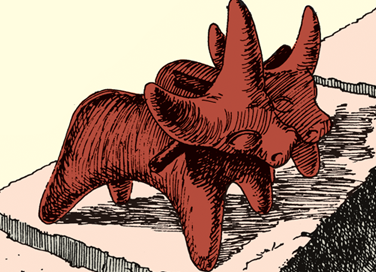
Toys of Indus Valley Civilization
The people of the Indus Valley civilization had mastered the art of making toys out of clay.
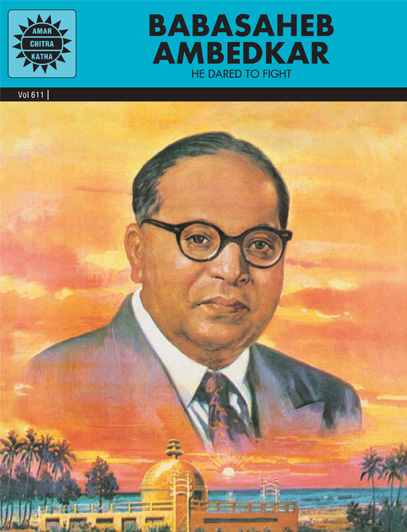
Comic of The Month
Babasaheb Ambedkar
He was from a respectable family, well-educated and a lawyer, yet many Indians thought of him as ‘untouchable’. It was up to BR Ambedkar to teach his ‘depressed’ community to fight the injustices that it faced each day. Hard working and wise, he became the icon of the underprivileged. History, however, will remember him as the architect of India’s Constitution.

WEEKEND SALE: Subscribe For Just ₹̶2̶9̶9̶9̶ ₹699
Mother, Guru: How Jijabai Helped Her Son Achieve His Dream Of Hindavi Swarajya
Shefali Vaidya
Jun 01, 2023, 10:51 PM | Updated 10:51 PM IST
Save & read from anywhere!
Bookmark stories for easy access on any device or the Swarajya app .
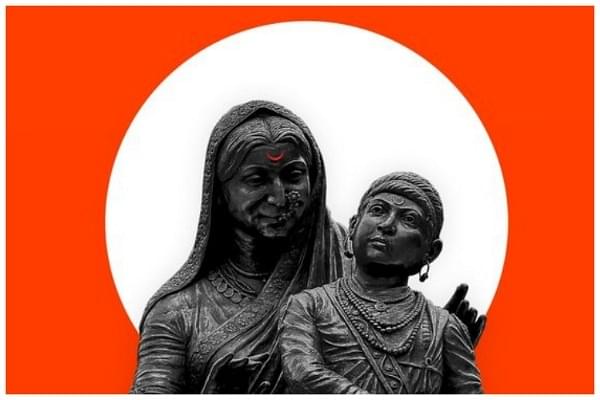
- In raising a young Shivaji almost single-handedly, it was Jijabai who sowed the seeds of Hindavi Swarajya.
A couple of years ago, I had gone to meet Padma vibhushan Babasaheb Purandare, a great historian who had dedicated his entire life to spread Shivcharitra among the people of Maharashtra.
I asked him a question that had been in my mind for many years, ‘what made Shivaji Maharaj so different from his contemporaries at such an young age?
Why did he choose to dedicate his life to carve out an independent Hindu kingdom, when he could have chosen the easy way out and serve as a feudal lord at the court of one of the Deccan sultanates like his father.
Babasaheb smiled that knowing half-smile of his, and replied with the customary twinkle in his eye, ‘he had a mother like Jijabai’!
No story of Chhatrapati Shivaji Maharaj is complete without the story of his mother, Jijabai or Jijau as she is known in Maharashtra fondly, who was the embodiment of feminine power. Jijau’s contribution in the making of Shivaji was second to none.
Every historian who has written about Shivaji Maharaj has acknowledged the important and inspiring role Jijabai played in her son’s life.
Shivaji, the younger son of a Sardar in Nizam’s court, Shahajiraje Bhosle became the last Hindu sovereign king in India, Chhatrapati Shivaji Maharaj only because of Jijabai’s upbringing and the values she inculcated in him when he was very young.
Even if we judge her by today’s standards, Jijabai comes across as a fierce, strong woman who was always clear about her goal.
She was a single mother for almost her entire life. Jijabai was born on 12 January 1598 to Mhalasabai and Lakhujirao Jadhav of Sindkhedraja. Lakhujiraje Jadhav was a Maratha nobleman at the court of the Nizam.
As was the custom of the day, Jijabai was married at an early age to Shahajiraje Bhosle, then also a nobleman at the court of the Nizam. Jijabai had eight children, six daughters and two sons. Shivaji was her youngest son.
When Jijabai was pregnant with Shivaji, Shahaji Raje left her behind at Shivneri fort as he had changed his allegiance to Adil Shahi of Bijapur and was appointed as the Jahagirdar of Karnataka. As he had changed loyalties, he was being pursued by his father-in-law’s forces.
As Jijabai was heavily pregnant, Shahaji Raje thought it was best to leave her behind at Shivneri.
Shivaji was born at Shivneri in the absence of his father and any close family member. As a nobleman at the court of Bijapur, Shahaji Raje was deputed to administer southern Deccan and lived in Bengaluru.
When Shivaji was six years old, Shahaji sent Jijabai and Shivaji to Pune to administer his jagir of Pune with his trusted aide, Dadoji Konddev.
When a young Shivaji and his mother moved to Pune, the village lay destroyed and abandoned. Murar Jagdeo, a Maratha sardar from the Nizam’s court had destroyed Pune as retribution when Shahaji had moved his allegiance to Adil Shah.
Jijabai encouraged the people of Pune to move back in the village and famously made a young Shivaji plough the land with a golden plough as a gesture of rehabitation.
Jijabai was an able administrator who managed her husband’s jagir with an iron hand with the able help of Dadoji. She saw to the cultural and religious development of Pune by building the Kasba Ganpati temple and renovating the Tambdi Jogeshwari temple.
As a single mother, Jijabai was the greatest influence on a young Shivaji. She encouraged him to read stories from Hindu scriptures to develop a strong moral compass in her son.
She was also a skilled warrior and a horse rider. She often rode alongside her son and encouraged him to get out of his palace and mingle amongst common people to see how they lived.
Shivaji, though the son of a nobleman, grew up amongst common people. Many of his childhood friends became his most trusted warriors who later helped him achieve his dream of Hindavi Swarajya .
Jijabai watched her son like a hawk, keeping him focused and away from distractions and vices.
It was her influence that made him dream big, and not just be content with being a good jagirdar . Having seen the plight of Hindu women under the Islamic rule, Jijabai encouraged Shivaji to think about establishing an independent Hindu kingdom, where rights of Hindus would be respected.
She also taught him to be always protective about women and treat them with honour, a lesson Shivaji never forgot. When he established his kingdom, he instituted extremely harsh punishments to anyone who dared to dishonour or disrespect a woman, even a woman from the enemy camp.
Early in his career, Jijabai encouraged Shivaji Maharaj to avenge the death of her eldest son Sambhaji at the hands of Afzal Khan, a desire that Shivaji Maharaj fulfilled to her great satisfaction.
When Shivaji Maharaj used to participate in military campaigns, often staying away from the headquarters for months, it was Jijabai who ruled as the queen regent in his stead.
When Shivaji Maharaj was compelled to accept the humiliating terms the treaty of Purandar by Mirza Raja Jaisingh fighting for Aurangzeb, it was Jijabai who counselled Shivaji Maharaj to not lose heart and focus on the greater goal. She encouraged him to accept the treaty as a tactical move.
When Shivaji Maharaj was summoned to Agra by Aurangzeb and there was no guarantee of his safe return, it was Jijabai who put away her own sorrow, fear and worry to ably administer the kingdom in Shivaji Maharaj’s absence.
She was a doting, but watchful grandmother to Shivaji’s eldest son Sambhaji after his mother died soon after giving birth to him.
Jijabai was also a social reformer who strongly backed Shivaji Maharaj when he brought in revolutionary changes in his kingdom like land reforms, social equality and readmitting converted Hindus to Dharma.
Such was Jijau’s bond with her son that she restrained from committing Sati after her husband’s death, even though it was the custom of the time.
Her life’s mission was fulfilled when she witnessed the grand coronation ceremony of Shivaji Maharaj that officially made him the first sovereign Hindu king of India since the fall of the Vijayanagara empire.
She passed away barely twelve days after the coronation ceremony at the age of 76, a content woman who had turned a dream of an independent Hindu kingdom into reality.
Jijabai was known for her virtue, valour and values, traits that she passed down to her illustrious son. She championed the cause of Swarajya and helped and inspired Shivaji Maharaj to unite the feuding Maratha factions to establish the ‘ Hindavi Swarajya ’ that lasted till the 19th century.
Jijabai’s stellar qualities — like her fiercely independent nature, her exemplary leadership skills, her commitment to Dharma, her intolerance of injustice, and her single-minded clarity that made Shivaji Maharaj into what he was, a visionary leader who continues to inspire generations of Indians.
Jijabai Bhosle’s well-lived is living proof of what a mother can achieve if she is committed to the future of her children.
As we offer tributes to Chhatrapati Shivaji Maharaj on the 350th anniversary of his coronation, the tributes are not complete till we salute the woman who turned Shivaji into Shivaji Maharaj.
The writer is a freelance writer and newspaper columnist based in Pune.
- Chhatrapati Shivaji
- Hindavi Swarajya
- 350 years of Swarajya
Join our WhatsApp channel - no spam, only sharp analysis
Introducing ElectionsHQ + 50 Ground Reports Project
The 2024 elections might seem easy to guess, but there are some important questions that shouldn't be missed.
Do freebies still sway voters? Do people prioritise infrastructure when voting? How will Punjab vote?
The answers to these questions provide great insights into where we, as a country, are headed in the years to come.
Swarajya is starting a project with an aim to do 50 solid ground stories and a smart commentary service on WhatsApp, a one-of-a-kind. We'd love your support during this election season.
Click below to contribute.
Get Swarajya in your inbox.
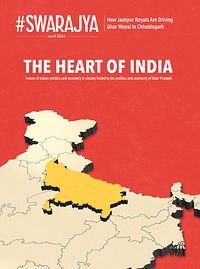
PM Modi Dashboard: Supreme Court Has Delivered A Big Blow To Those Casting Doubts On EVMs And Intending To Loot The Ballot Boxes
[interview] ‘defeating fascism need of the hour, rahul not serious about it': cpi wayanad candidate annie raja, mysuru royals return to electoral politics after 20 years — a ground report.
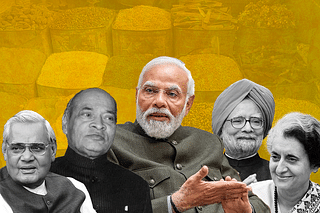
Data Reveals PM Modi Has Best Record On Inflation Among All Prime Ministers
Global south faces trade disruption: green industrial policies of major economies raise alarms, how pm modi's approach to policy differs from that of the upa government — economist shamika ravi explains, infrastructure, indian-russian consortium to operate 'world’s emptiest airport' in sri lanka, indigo enters widebody space with order for 30 airbus a350-900 aircraft, eyeing foray into long-haul routes, bengaluru suburban rail: k-ride considers doddajala route for kempegowda international airport connectivity, bengaluru metro: eight firms bid for feasibility study of 52-km tumakuru extension.

Indian Air Force Just Tested The Missile The Israelis Used To Hit Iran Last Week
Drdo is planning to test astra mk-2 missile; here's a lowdown on the new 130 km range air-to-air missile, india's indigenous technology cruise missile demonstrates sea skimming capability.

Pro-Hamas Students' Protests In US: Dramatic Scenes Unfold On University Campuses As Hundreds Arrested By Police Clad In Riot Gear
No president biden, the recent aid to ukraine will not bring peace.
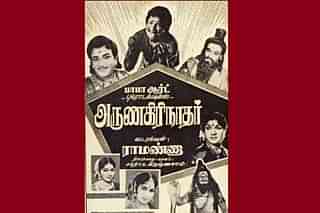
A Movie That Weakened The Dravidian Hold On Tamil Film Industry
Where 22 january 2024 stands in global history, ramlalla will be adorned with a surya tilak at the same time every ram navmi - here's how it will work.

Bengaluru Suburban Rail: SWR Transfers 115 Acre Land For Kanaka Corridor, Commits To Approve Airport Line Alignment
From olive green to shades of saffron — dakshina kannada bjp candidate capt brijesh chowta on his vision for karnataka's coast, karnataka: 'winnability' is an excuse, congress fielding kin of ministers, mlas because no good candidates would bet on it.
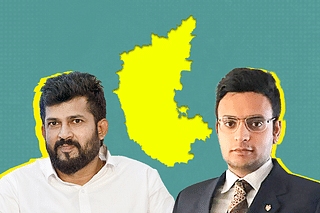
Mysore Maharaja In, Pratap Simha Out — Why The BJP May Have Arrived At This Decision
What to expect from bjp's karnataka list — key issues, possible candidates, likely outcome, bengaluru cafe blast: karnataka home minister suspects intention to deter investors, bjp says congress hiding facts.
Check out 16 Return-To-Work Programs In India For Ambitious Women Like You!
Rajmata Jijau – Kingmaker And A Powerful Feminist Woman In The 17th Century
Rajmata Jijau Bhosale, the mother of Shivaji, the Maratha king, was a feminist who believed in doing the right thing, no matter what the circumstances.

Rajmata Jijau, the mother of Shivaji, the Maratha king, was a feminist who believed in doing the right thing, no matter what the circumstances.
Recently we had the birth anniversary of Jijabai Bhosale, commonly (and fondly) known as Jijau or Rajmata Jijau (on 12th of January). Most of us know of her as the mother of Shivaji – The founder of Maratha empire.
I would rather like the world to know Jijau as – ‘The Mother who nurtured her son to be Shivaji – the founder of Maratha empire’ . This is because Jijau’s contribution in the making of Shivaji was enormous. We really owe the Hindavi Swarajya to Jijau because without her upbringing and the values she inculcated into her child , we could not have got a king, a warrior like Shivaji.
Jijau was a very powerful Indian woman; in the 16th century, she really had everything that we see in today’s feminist women .
When her husband had to move to the South as a part of his duties towards Adilshah, he sent Jijau with little Shivaji to Pune and declared her the queen regent. Pune was a wild forest then. Jijau with the help of her council of ministers changed the face and eventually the fate of Pune, and successfully handled her duties as queen regent.
This was along with a 5 year old kid whom she gave the best upbringing possible. Much like today’s women who stay away from husbands who are away as a part of work/career. On an average in all long distant couples , its the woman who looks after the kids and the family; many times along with her full time job.
She stood by the side of her husband in his tussle against her own father who was wrong, even if she had a deep affection for her father, showing her commitment to her marriage. It was Jijau who convinced society to accept Bajaji Nimbalkar who had been forced to convert to Islam, when he wanted to come back to Hinduism. She did not think of consequences and supported what was right, which showed her ability to fight for the right cause.
She was a woman with vision , foresightedness and was passionate about her dream of achieving freedom for all her people. Her conduct was so influential that all mothers were willingly ready to sacrifice their sons to establish freedom. She is often referred as a ‘Lioness’ for all the bold and brave traits that Shivaji eventually got from his mother. She was the first mentor to Shivaji and was responsible for most of his education; having him learn about the Holy scriptures and arts of administration and weaponry, and the political situations in the land.

Never miss real stories from India's women.
She raised Shivaji in such a manner that in an era where women were treated as inferior and being molested openly by the enemies, Shivaji grew up into a man, a king who treated every woman (even those belonging to enemies camp) with immense respect and he always kept safety of women as his top priority.
Jijabai supported gender equality and rooted it in the culture that women are not inferior but should be treated as EQUALs. If all mothers of today world can get this attitude in their children , I am sure the incidents of molestations, rapes and violence against women can be avoided.
Jijabai’s stellar qualities — like her independent nature, leadership skills, strong instinct to stand up against evil, passion for dreams, decision making ability and clarity of thought are some of the things that make me relate today’s women to Jijabai or vice-versa.
Jijabai Bhosale was undoubtedly a great woman, a strong mother and a role model for today’s women. There is much more to write about or learn from her life. Her birth anniversary just reminded me of the immense power each woman has and the contribution she can make, to improve this society, and to improve the status of women in our society.
Liked this post?
Become a premium user on Women’s Web and get access to exclusive content for women, plus useful Women’s Web events and resources in your city.
Image source: By Bharath12345 at English Wikipedia (Transferred from en.wikipedia to Commons.) [Public domain], via Wikimedia Commons
About the Author

Sheetal Nawalkar Wathare
A Perfect Libran, is how I define myself!! . Striking the Right Balance is my MANTRA - may it be between Life@work & Life@home, Family & Friends, Myself & My relationships. Writing is my passion, reading is my read more...
Other Articles by Author
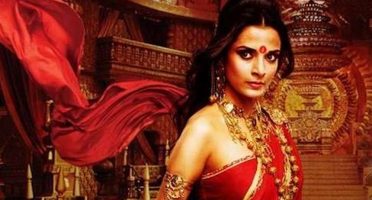
Her Hair Flaming, Draupadi Rose From The Ashes
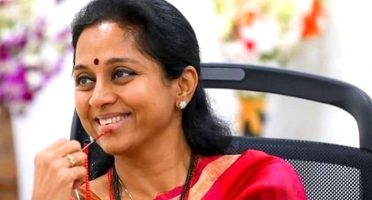
Will Maharashtra Be Ready For Its 1st Woman CM By The Next Elections?
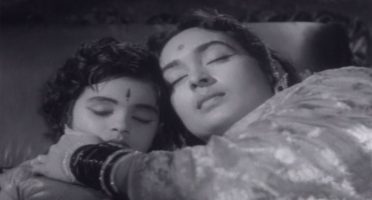
Life Never Stops... With Or Without A Loved One

Six Virtues Of A Good Wife? Really? Time To Re-Interpret These
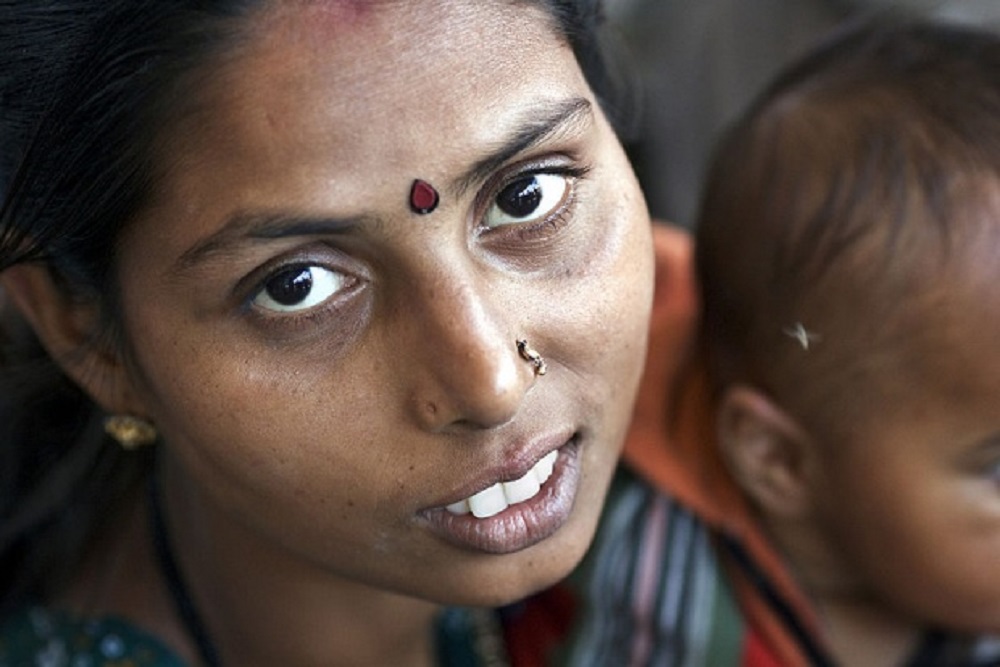
It Takes A Village... [#ShortStory]
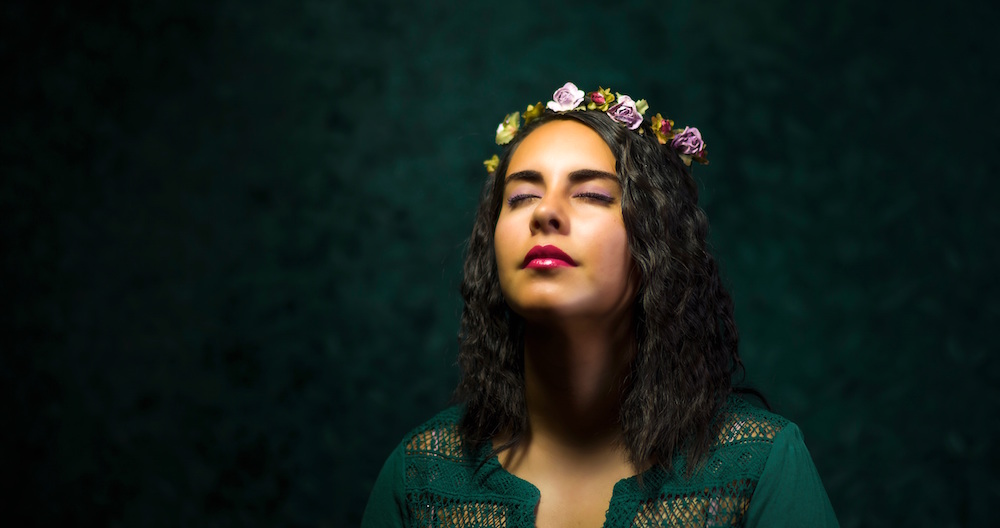
5 New Year Resolutions For Women That We Need To Seriously Adopt!
Follow women's web.
- newsletters
Stay updated with our Weekly Newsletter or Daily Summary - or both!
There Is A Prachi In All Of Us! Why, As A Society, Can’t We Look Beyond Appearance?
UP Boards Topper Prachi Nigam was trolled on social media for her facial hair; our obsession with appearance is harsh on young minds.

Related Videos

Add Email Address
Please enter your email address
- (+93) Afghanistan
- (+355) Albania
- (+213) Algeria
- (+1) American Samoa
- (+376) Andorra
- (+244) Angola
- (+1) Anguilla
- (+1) Antigua
- (+54) Argentina
- (+374) Armenia
- (+297) Aruba
- (+61) Australia
- (+43) Austria
- (+994) Azerbaijan
- (+973) Bahrain
- (+880) Bangladesh
- (+1) Barbados
- (+375) Belarus
- (+32) Belgium
- (+501) Belize
- (+229) Benin
- (+1) Bermuda
- (+975) Bhutan
- (+591) Bolivia
- (+599) Bonaire, Sint Eustatius and Saba
- (+387) Bosnia and Herzegovina
- (+267) Botswana
- (+55) Brazil
- (+246) British Indian Ocean Territory
- (+1) British Virgin Islands
- (+673) Brunei
- (+359) Bulgaria
- (+226) Burkina Faso
- (+257) Burundi
- (+855) Cambodia
- (+237) Cameroon
- (+1) Canada
- (+238) Cape Verde
- (+1) Cayman Islands
- (+236) Central African Republic
- (+235) Chad
- (+56) Chile
- (+86) China
- (+57) Colombia
- (+269) Comoros
- (+682) Cook Islands
- (+225) Côte d'Ivoire
- (+506) Costa Rica
- (+385) Croatia
- (+599) Curaçao
- (+357) Cyprus
- (+420) Czech Republic
- (+243) Democratic Republic of the Congo
- (+45) Denmark
- (+253) Djibouti
- (+1) Dominica
- (+1) Dominican Republic
- (+593) Ecuador
- (+20) Egypt
- (+503) El Salvador
- (+240) Equatorial Guinea
- (+291) Eritrea
- (+372) Estonia
- (+251) Ethiopia
- (+500) Falkland Islands
- (+298) Faroe Islands
- (+691) Federated States of Micronesia
- (+679) Fiji
- (+358) Finland
- (+33) France
- (+594) French Guiana
- (+689) French Polynesia
- (+241) Gabon
- (+995) Georgia
- (+49) Germany
- (+233) Ghana
- (+350) Gibraltar
- (+30) Greece
- (+299) Greenland
- (+1) Grenada
- (+590) Guadeloupe
- (+502) Guatemala
- (+44) Guernsey
- (+224) Guinea
- (+245) Guinea-Bissau
- (+592) Guyana
- (+509) Haiti
- (+504) Honduras
- (+852) Hong Kong
- (+36) Hungary
- (+354) Iceland
- (+91) India
- (+62) Indonesia
- (+964) Iraq
- (+353) Ireland
- (+44) Isle Of Man
- (+972) Israel
- (+39) Italy
- (+1) Jamaica
- (+81) Japan
- (+44) Jersey
- (+962) Jordan
- (+7) Kazakhstan
- (+254) Kenya
- (+686) Kiribati
- (+965) Kuwait
- (+996) Kyrgyzstan
- (+856) Laos
- (+371) Latvia
- (+961) Lebanon
- (+266) Lesotho
- (+231) Liberia
- (+218) Libya
- (+423) Liechtenstein
- (+370) Lithuania
- (+352) Luxembourg
- (+853) Macau
- (+389) Macedonia
- (+261) Madagascar
- (+265) Malawi
- (+60) Malaysia
- (+960) Maldives
- (+223) Mali
- (+356) Malta
- (+692) Marshall Islands
- (+596) Martinique
- (+222) Mauritania
- (+230) Mauritius
- (+262) Mayotte
- (+52) Mexico
- (+373) Moldova
- (+377) Monaco
- (+976) Mongolia
- (+382) Montenegro
- (+1) Montserrat
- (+212) Morocco
- (+258) Mozambique
- (+95) Myanmar
- (+264) Namibia
- (+674) Nauru
- (+977) Nepal
- (+31) Netherlands
- (+687) New Caledonia
- (+64) New Zealand
- (+505) Nicaragua
- (+227) Niger
- (+234) Nigeria
- (+683) Niue
- (+672) Norfolk Island
- (+850) North Korea
- (+1) Northern Mariana Islands
- (+47) Norway
- (+968) Oman
- (+92) Pakistan
- (+680) Palau
- (+970) Palestine
- (+507) Panama
- (+675) Papua New Guinea
- (+595) Paraguay
- (+63) Philippines
- (+48) Poland
- (+351) Portugal
- (+1) Puerto Rico
- (+974) Qatar
- (+242) Republic of the Congo
- (+40) Romania
- (+262) Runion
- (+7) Russia
- (+250) Rwanda
- (+290) Saint Helena
- (+1) Saint Kitts and Nevis
- (+508) Saint Pierre and Miquelon
- (+1) Saint Vincent and the Grenadines
- (+685) Samoa
- (+378) San Marino
- (+239) Sao Tome and Principe
- (+966) Saudi Arabia
- (+221) Senegal
- (+381) Serbia
- (+248) Seychelles
- (+232) Sierra Leone
- (+65) Singapore
- (+1) Sint Maarten
- (+421) Slovakia
- (+386) Slovenia
- (+677) Solomon Islands
- (+252) Somalia
- (+27) South Africa
- (+82) South Korea
- (+211) South Sudan
- (+34) Spain
- (+94) Sri Lanka
- (+1) St. Lucia
- (+249) Sudan
- (+597) Suriname
- (+268) Swaziland
- (+46) Sweden
- (+41) Switzerland
- (+963) Syria
- (+886) Taiwan
- (+992) Tajikistan
- (+255) Tanzania
- (+66) Thailand
- (+1) The Bahamas
- (+220) The Gambia
- (+670) Timor-Leste
- (+228) Togo
- (+690) Tokelau
- (+676) Tonga
- (+1) Trinidad and Tobago
- (+216) Tunisia
- (+90) Turkey
- (+993) Turkmenistan
- (+1) Turks and Caicos Islands
- (+688) Tuvalu
- (+1) U.S. Virgin Islands
- (+256) Uganda
- (+380) Ukraine
- (+971) United Arab Emirates
- (+44) United Kingdom
- (+1) United States
- (+598) Uruguay
- (+998) Uzbekistan
- (+678) Vanuatu
- (+58) Venezuela
- (+84) Vietnam
- (+681) Wallis and Futuna
- (+212) Western Sahara
- (+967) Yemen
- (+260) Zambia
- (+263) Zimbabwe
Academic Test Guide
10 Lines on Jijabai in English for Students
In this article, we are providing 10 Lines on Jijabai in English for Students & kids. In these lines, we have tried to give detailed information about Jijabai in English ten line essay for students.
( Set-1 ) 10 Lines on Jijabai
1 The Indian historical figure Jijabai was born on 12 January 1598 and is also referred to as Rajmata.
2 Jijabai was the mother of Chattrapati Sivaji who was the founder of the great Maratha Empire.
3 She was born in the influential family of the Yadavs of Devagiri to Lakhuji Jadhav and Mahalasabai Jadhav in Buldhana District.
4 From the birth of Shivaji, she introduced him to the values of courage, patriotism, and righteousness.
5 She was always known for her strong will and strong vision in establishing a sovereign Maratha state.
6 During the struggle of Shivaji with Mughal and Deccan Sultanate rulers, she gave her moral support.
7 Shivaji’s early military campaigns and political maneuvering were guided by Jijabai.
8 Not only in her family but she was also respected by other high-rank commanders and nobles within the Maratha ranks.
9 Her impact and legacy are still living with the achievements of her son Shivaji through the Maratha empire.
10 She is celebrated in Indian History for strong leadership and nurturing mother.
10 lines on Chhatrapati Shivaji Maharaj
( Set-2 ) 10 Lines on Jijabai in English
1 Jijabai is a very important figure in the Maratha Empire, Jijabai also known by the name Rajmata Jijabai.
2 She was the mother of the greatest warrior, leader, and founder of the Maratha Empire Shivaji.
3 Jijabai was born into a noble family of Mhalasabai Jadhav and Lakhuji Jadhav with symbol of strength and wisdom.
4 From the birth of Shivaji, she taught him the importance of values, bravery, and kindness towards others.
5 Jijabai supported Shivaji’s dreams of creating a just and independent kingdom for their people.
6 She always stood by Shivaji in his struggling time during the war with her guidance and encouragement.
7 Shivaji became one of the most respected leaders and rulers with the will and belief of his mother.
8 She always made Shivaji walk on the path to fight against injustice and tyranny to protect other people.
9 Her legacy has inspired everyone to recall her mother’s love and the importance of standing up for what is right.
10 Through her strength and devotion, Jijabai continues to inspire generations of children to be brave and compassionate leaders.
Leave a Comment Cancel reply
Save my name, email, and website in this browser for the next time I comment.

SILENT COURSE
Essay Writing, Letter Writing, Notice Writing, Report Writing, Speech, Interview Questions and answers, government exam, school speeches, 10 lines essay, 10 lines speech
- Hindi Essay
- Eng. Speech
- Hindi Speech
- Notice Writing
- Report Writing
Saturday, February 10, 2024
Essay on jijabai - jija bai essay - about jijabai - rajmata jijabai essay.

Such a powerful portrayal of Jijabai's pivotal role in history! Her unwavering determination and influence on Shivaji's legacy are truly inspiring. Looking forward to Invisible Text reading more about her journey.
28 फरवरी ➤ राष्ट्रीय विज्ञान दिवस - National Science Day
- ➤ राष्ट्रीय विज्ञान दिवस पर निबंध
- ➤ सी.वी रमन जी पर निबंध
- ➤ राष्ट्रीय विज्ञान दिवस पर 10 वाक्य
- ➤ Essay on National Science Day In English
- ➤ Essay on C.V. Raman In English
- ➤ 10 Lines on National Science Day
- ➤ 10 Lines on National Science Day In English
एक देश, एक चुनाव / One Nation One Election
- - एक देश एक चुनाव पर निबंध
- - एक देश, एक चुनाव पर 10 वाक्य
- - Essay on One Nation, One Election In English
- - 10 Lines on One Nation, One Election In English
आदित्य एल1 मिशन / Aditya-L1 Mission
- - आदित्य एल1 मिशन पर निबंध
- - आदित्य एल1 मिशन पर 10 पंक्ति
- - Essay on Aditya-L1 Mission In English
- - 10 Lines on Aditya-L1 Mission In English
चंद्रयान 3 / Chandrayaan-3
- - चंद्रयान 3 पर निबंध
- - चंद्रयान 3 पर 10 पंक्ति
- - Essay on Chandrayaan 3
- - 10 Lines on Chandryaan-3
Popular Posts
- Write A Letter To Your Friend Congratulating Him On His Success In The Examination Q. Write A Letter To Your Friend Congratulating Him On His Success In The Examination. Ans : RZH-333, Street-9 Bangalore Road Mysore - 570...
- Write An Application To The Principal For Fee Concession Q. Write An Application To The Principal For Fee Concession. Ans : Letter Writing To The Principal Adarsh School Dwarka Sec - 7 Delhi :...
- Write A Letter To Your Friend Inviting Him To Spend Summer Vacation With You Q. Write A Letter To Your Friend Inviting Him To Spend Summer Vacation With You. Examination Hall Palika Road, Delhi 17th May...
- अंतर्राष्ट्रीय योग दिवस पर निबंध - Essay on International Yoga Day In Hindi - 21st June Essay on International Yoga Day In Hindi (300 Words) अंतर्राष्ट्रीय योग दिवस पर निबंध अंतर्राष्ट्रीय योग दिवस हर साल 21 जून को पुरे विश्व मे...
- Essay on Dr. APJ Abdul Kalam In 300 Words Essay on Dr. APJ Abdul Kalam In English | 300 Words Father of India Missile Programmed Dr. A.P.J Abdul Kalam is the 11 th president of...
- How To Write An Application to The Principal For Sick Leave (How To Write An Application To The Principal For Sick Leave) To The Principal Delhi Convent School Subject : Application...
- दो दिन की छुट्टी / अवकाश के लिए प्रधानाचार्य जी को आवेदन पत्र या प्रार्थना पत्र - Write An Application To The Principal For Leave Two Days Question : Write An Application To The Principal For Leave Two Days दो दिन की छुट्टी / अवकाश के लिए प्रधानाचार्य जी को आवेदन पत्र या ...
- स्कूल छोड़ने के लिए प्रधानाचार्य जी को प्रार्थनापत्र - Write An Application To The Principal For School Leaving Certificate In Hindi Question : Write An Application To The Principal For School Leaving Certificate प्रश्न : स्कूल छोड़ने के लिए प्रधानाचार्य जी को प्रार्थ...
- Fee Installment के लिए आवेदन - Application For Fee Installment In School In Hindi Fee Installment के लिए आवेदन | Application For Fee Installment In School In Hindi दिनांक :- सेवा में प्रधानाचार्य / प्रधानाचा...
- Write An Application To The Principal For A School Picnic Q. Write An Application To The Principal For A Picnic Q. Application to the principal to arrange for school picnic Q. Application for Per...
- - Road Accident Report Writing
- - Fire Accident Report Writing
- - Kerala Flood Report Writing
- - Pulwama Attack Report Writing
- - Blood Donation Camp Report Writing
- - Lost Wrist Watch Notice Writing
- - Lost Water Bottle Notice Writing
- - Lost Pencil Box Notice Writing
- - Fancy Dress Competition Notice Writing
- - Sick Leave Application
- - School Leaving Certificate
- - For Scholarship
- - Fee Concession
- - Congratulation Letter (Exam)
- - Application for Picnic
- English-Essay (120)
- Hindi-Essay (120)
- 10-Lines-English (31)
- 10-Lines-Hindi (31)
- English-Festival-Essay (25)
- Hindi-Festival-Essay (25)
- Hindi-Speech (19)
- Hindi-Letter (18)
- 10-Lines-Speech (15)
- English-Speech (14)
- English-Letter (13)
- Freedom-Fighter-Hindi-Essay (13)
- Freedom-Fighter-Essay (12)
- 10-Lines-Hindi-Speech (8)
- 10-lines-hindi-essay (8)
- 10-Lines-Essay (5)
- English-Notice (5)
- English-Report (5)
- 10-Lines-Domestic-Animal (4)
- 10-Lines-Historical-Monuments (2)
- 10-Lines-Wild-Animal (2)
- Freshers-Interview (2)
- Experienced-Interview (1)
Site Information
- Privacy Policy
Contact Form
Total pageviews.
Celebrating Life
- Entertainment
- Food and Stay
- Collaborate
- Search for: Search
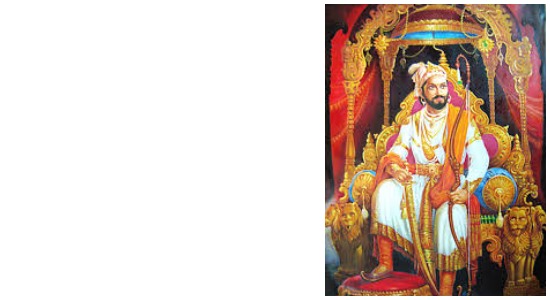
Essay On Shivaji Maharaj In English – Chhatrapati Shivaji
Indian history is full of the stories of valour of its men and women. One such hero was the Maratha king Shivaji. Here we present an essay on Shivaji Maharaj which will be useful for students to pen their own essay on the subject. Whether you are looking for a short essay on Shivaji Maharaj or a few lines on Shivaji Maharaj, you shall find this post useful.
Table of Contents
Essay On Shivaji Maharaj In English
The essay on Shivaji Maharaj in English is given in 3 different forms to suit different students. There is a long essay for senior students, a paragraph on Shivaji, and 10 lines on Shivaji Maharaj for junior students . You can use any of these based on your requirement and write an essay on Shivaji Maharaj in your own words.
Essay On Shivaji Maharaj | 10 Lines On Shivaji Maharaj
- Chhatrapati Shivaji Maharaj was a brave king who established the Maratha empire
- Shivaji was born inside the fort town of Shivneri in Maharashtra on 19, February 1627
- Shivaji’s parents were Shahaji Bhonsle and his mother was Jijabai Bhonsle
- Shivaji was brave and even as a boy of 15, he captured three forts
- Shivaji was crowned as Chhatrapati Shivaji in the fort of Raigad in the year 1674
- Shivaji was very religious and had been brought up listening to Hindu scriptures by his mother Jijabai
- Though Shivaji was a devout Hindu he was tolerant and supported other religions too
- Chhatrapati Shivaji died in the year 1680 from an illness
- Sambhaji Bhosale, Shivaji’s eldest son succeeded him as the Chhatrapati of the Maratha Empire
- February 19 is celebrated as Chhatrapati Shivaji Jayanti to commemorate the birth of the brave Maratha king
Essay On Shivaji Maharaj | Paragraph On Shivaji
Shivaji is one of the shining stars of Indian history. The tales of his bravery and valour are legendary and have been inspiring Indians for generations. Shivaji was born Shivaji Bhonsale to Shahaji Bhonsale and Jijabai in Shivneri on the 19th of February, 1630. His military career took off at the young age of 15 when he captured the Torna Fort, Chakan Fort, and the Kondana fort.
Shivaji founded the Maratha Empire with its capital as Raigad and expanded it by capturing one fort after another. He fought with the Mughal Empire, the British and other feudal powers to establish his kingdom. He was known to be a just ruler who was also a very devout Hindu. Shivaji was crowned Chhatrapati Shivaji in the year 1674 at Raigad Fort. He died in the year 1680 due to an illness. His eldest son Sambhaji succeeded him as the Chhatrapati. !9th February is celebrated as Chhatrapati Shivaji Jayanti to commemorate his birth anniversary.
Essay On Shivaji Maharaj In English | Long Essay On Shivaji
Raigad in Maharashtra is a historical place where the memory of the brave warrior king Shivaji still lives on. At a distance of about 132 kilometres is Raigad, an impressive fort that stands atop a hill at a height of about 2,700 feet. Within the fort are the ruins of the once-thriving capital of the Maratha Empire. The royal palace of Shivaji used to be inside the fort. However, the palace is completely destroyed and only ruins in the form of pillars remain. The tomb of Shivaji is inside the fort and along with him is the tomb of his faithful dog named Waghya.
Shivaji was born to Shahaji Bhonsale and Jijabai in the fortified town of Shivneri on the 19th of February, 1630. Shivaji’s father was a General who worked for the Deccan Sultanate rulers. His mother Jijabai was a very pious lady who inculcated religious values in the young Shivaji from an early age.
Shivaji who was born into a family of warriors showed his valour from an early age. He was only 15 when he captured three forts, namely, Torna Fort, Chakan Fort, and the Kondana fort. He slowly expanded his kingdom capturing fort after fort and it soon spread across Western and Central India. This was the Maratha Empire established by Shivaji who was crowned as Chhatrapati Shivaji at Raigad in the year 1674.
Shivaji Maharaj’s military exploits are legendary. He fought the Mughal Empire, Bijapur Sultanate, Golconda Sultanate, and the British. One of his famous exploits is his encounter with Afzal Khan, a General of the Bijapur Sultanate. A battle between the forces of Shivaji and that of the Bijapur Sultanate led by Afzal Khand had reached a standoff. Afzal Khan then suggested a personal meeting with Shivaji to sort out the issue. The condition was that each leader would come unarmed and with just one attendant.
The shrewd Shivaji got wind of the evil designs of Afzal Khan and wore armour under his robes. He also armed himself secretly with a tiger claw and a dagger. His suspicion proved correct and he was attacked. But the brave Shivaji killed Afzal Khan with the tiger-claw and escaped.
The heroic Chhatrapati Shivaji breathed his last, after suffering from an illness, inside the Raigad Fort, on the 3rd of April, 1980. The tales of his valour still remain to inspire his countrymen for years to come.
We hope you liked our essay on Shivaji Maharaj in English and hope that it helps you to write about Shivaji in your own words. Do check out some of our other essays on, Mahatma Gandhi , Teachers Day , Republic Day , and many others. Also please subscribe to our blog for more useful posts.

Thanks for visiting our site nirvandiaries.com and taking the time to read this post.
If you wish to collaborate or work with us then reach us at [email protected]
We’d love it if you’d comment by sharing your thoughts on this post and share this post on social media and with your friends.
Follow our journey on our social media channels: Facebook Twitter Instagram Pinterest
Also check out these Posts:
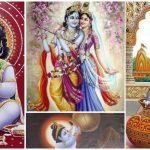
Leave a Comment Cancel Reply
Your email address will not be published. Required fields are marked *
Save my name, email, and website in this browser for the next time I comment.
Privacy Overview

COMMENTS
Jijabai was born on 12 January 1598, to Mhalasabai Jadhav and Lakhuji Jadhav at Sindkhed Raja in present-day Buldhana district of Maharastra. Jijabai was married at an early age to Shahaji Bhosle, son of Maloji Bhosle of Verul village, a military commander serving under the Nizam. Jijabai on a 1999 stamp of India.
Jijabai, affectionately known as 'jiu,' was born in 1598 A.D. to Lakhojiraje Jadhav in the revered territory of Sindkhed ...
Early Life. Jijabai was born on 12 January 1598 in a village named Sindkher. Her father's name was Lakhuji Jadhav and her mother was Mahalasabai Jadhav. Lakhuji Jadhav belonged to Deulgaon, near Sindkhed, in the present-day Buldhana district of Maharashtra. He was equally brave and ambitious and proud of his lineage.
Jijabai was born to Lakhojiraje Jadhav in Sindkhed territory of Vidharbh, Maharashtra in the year 1598 A.D. She was affectionately called as 'jiu'. Lakhojiraje Yadav was a Yadava, traditionally the rules of Devgiri. So, Jijau was actually the princess of Devgiri. But Lakhojiraje, along with his three sons accepted to be chieftains in the Sultan's
Jijabai Biography. Jijabai (1594-1674) was the mother of Shivaji, the legendary Maratha king and warrior who stood strong against the rivaling Mughal Empire. Jijabai was born in 1594 in the town ...
Jijabai would ernestly pray to Bhavanimata 'To destroy the villainous and for the protection of the nation and Dharma, bless me with a son like Shri Ram or a daughter like Goddess Durga who would vanquish the enemies. 4b. Longings during pregnancy. Jijabai would feel like wielding a sword, sit on a tiger and slay the enemies.
10 Lines on Jijabai in English . Jijabai was the mother of Shivaji, the founder of the Maratha Empire. She is commonly known as Rajmata Jijabai. She was born on 12 January 1598 in present-day Maharashtra, India. She was the daughter of Lakhujirao Jadhav. Her mother's name was Mahalasabai Jadhav. She was married to Shahaji Bhonsale.
Rajmata Jijau or Jijabai was born on January 12, 1598 in Deulgaon near Sindkhed in Maharashtra. She was the wife of Shahji Bhonsale, the son of Maloji Bhonsale of Verul village. She was a ...
Born on 16th February 1627 in Shivneri, Shivaji was the proud son of Shahji. This Shivaji Maharaj essay in English will tell you about the glory and valour of the people's king. Shivaji's mother Jijabai was also very strong in personality. She was virtuous and gave the proper education to her son to make him fearless.
Introduction: Jijabai Bhonsle (also Bhonsale, Bhosale, Bhosle) or Jadhav, also known as Rajmata, Rastramata, Jijabai, or Jijau, was the mother of Shivaji, the founder of the Maratha Empire, and lived from 12 January 1598 until 17 June 1674. She was the daughter of Sindkhed Raja's Lakhujirao Jadhav.
Jijabai had prayed for a son to be born who could lead the Marathas one day. When her prayers were answered, she left no stone unturned to mould Shivaji into a brave warrior. Jijabai almost single-handedly brought up Shivaji, as Shivaji's father Shahji was mostly away fighting on the battlefield. To receive more such stories in your Inbox ...
Jijabai Bhosle's well-lived is living proof of what a mother can achieve if she is committed to the future of her children. As we offer tributes to Chhatrapati Shivaji Maharaj on the 350th ...
Rajmata Jijau, the mother of Shivaji, the Maratha king, was a feminist who believed in doing the right thing, no matter what the circumstances. Recently we had the birth anniversary of Jijabai Bhosale, commonly (and fondly) known as Jijau or Rajmata Jijau (on 12th of January). Most of us know of her as the mother of Shivaji - The founder of ...
10 lines on Chhatrapati Shivaji Maharaj. ( Set-2 ) 10 Lines on Jijabai in English. 1 Jijabai is a very important figure in the Maratha Empire, Jijabai also known by the name Rajmata Jijabai. 2 She was the mother of the greatest warrior, leader, and founder of the Maratha Empire Shivaji. 3 Jijabai was born into a noble family of Mhalasabai ...
10 Lines on Jijabai 1) Jijabai Shahaji Bhosale was a great patriot of India. 2) Jijabai was mother of the great Maratha ruler Chhatrapati Shivaji. 3) Jijabai is also known as Rajmata and Jijau. 4) Jijabai was born on 12th January 1598 in Maharashtra. 5) Jijabai's father's name was Lakhuji Jadhav and mother's name was Mahalasabai Jadhav. 6) Jijabai was married to Shahaji Bhosale at an early age.
In From the Margins of Hindu Marriage: Essays on Gender, Religion, and Culture, ed. Lindsey, Harlan and Courtright, Paul B.. New York: Oxford ... and of the English Concerns in Indostan, from the Year M.DC.LIX. Reprint, New Delhi: Associated Publishing House ... "Jijabai—Ek Vir Patni" [Jijabai—One Brave Wife]. Boudhik Pustak. ...
Hello everyone, in this page we will write Essay on Jijabai In English Language. Jijabai. Jijabai was a prominent historical figure in Indian history. Jijabai also known as Rajmata Jijabai. She was the mother of the great Maratha warrior king Shivaji Maharaj. Jijabai was born on 12 January 1598 into the prominent Shirke family.
English Essay Writing Playlisthttps://youtube.com/playlist?list=PLgqPtvIGe10djZO_K9hihJgdz_M23sBarHello my dear viewersAbout videoToday in this video we will...
Shivaji Bhosle was born on February 19, 1630 to Shahaji Bhosle and Jijabai in the fort of Shivneri, near the city of Junnar of the Pune district. Shivaji's father Shahaji was in service of the Bijapuri Sultanate - a tripartite association between Bijapur, Ahmednagar, and Golconda, as a general. He also owned a Jaigirdari near Pune.
Jijabai Essay In English 10 Lines|| 10 Best Lines On Rajmata Jijabai|| #jijamata ##jijaji #jijabaiIf you like this video please Like Share and subscribe our...
10 Lines Essay On Jijabai | Essay On Rajmata JijauHello Friends,welcome to my channel Learning with Aaradhya10 Lines Speech On Veermata Jijabai IN ENGLISH10 ...
Speech On Veermata Jijabai IN ENGLISH | Essay On Veermata Jijabai IN ENGLISH | By Tutoring Planet.HELLO EVERYONE.In this video we have covered speech on veer...
Essay On Shivaji Maharaj | 10 Lines On Shivaji Maharaj. Chhatrapati Shivaji Maharaj was a brave king who established the Maratha empire. Shivaji was born inside the fort town of Shivneri in Maharashtra on 19, February 1627. Shivaji's parents were Shahaji Bhonsle and his mother was Jijabai Bhonsle. Shivaji was brave and even as a boy of 15, he ...